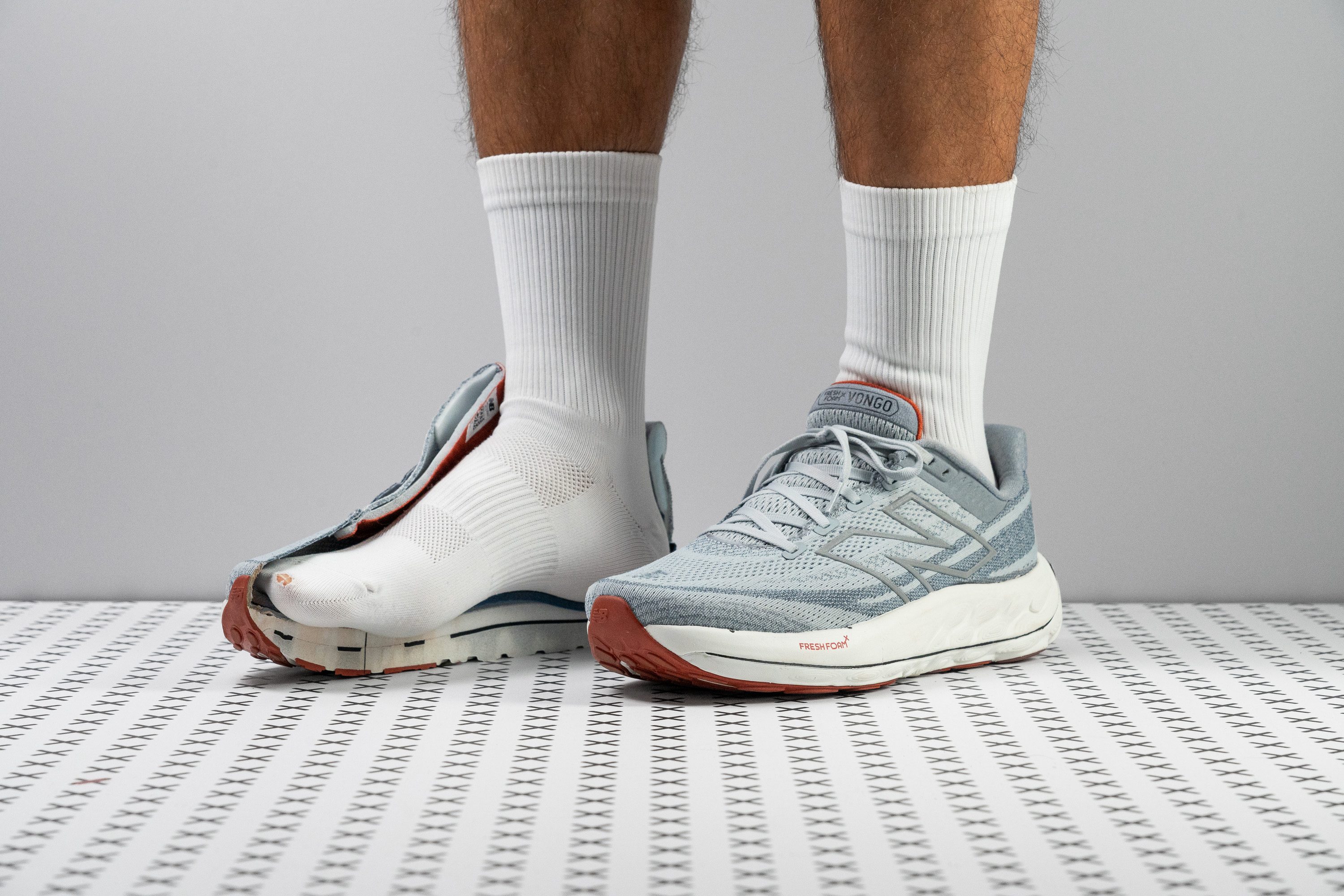Our verdict
- Top pick in best cushioned New Balance running shoes
Pros
- Flexible design
- Comfortable, high-quality upper
- Exceptional durability
- Perfect for easy paces
- Also suitable for neutral runners
- Excellent for long runs
- Reasonably priced
Cons
- Noticeably heavy
- Limited breathability
- Not the best for heel strikers
Audience verdict
- Top 24% in New Balance running shoes
- Top 15% in stability running shoes
- Top 10% most popular running shoes
Comparison
The most similar running shoes compared
+ + Add a shoe | |||||
|---|---|---|---|---|---|
| Audience score | 88 Great! | 85 Good! | 80 Good! | 88 Great! | |
| Price | $150 | $140 | $125 | $170 | |
| Pace | Daily running | Daily running | Daily running | Daily running | |
| Shock absorption | Moderate | Moderate | High | - | |
| Energy return | Low | Moderate | Moderate | - | |
| Traction | High | High | High | - | |
| Arch support | Stability | Stability | Stability | Stability | |
| Weight lab Weight brand | 11 oz / 312g 10.9 oz / 309g | 10.4 oz / 295g 10.5 oz / 298g | 8.1 oz / 231g 8 oz / 228g | 11.6 oz / 329g 11.8 oz / 334g | |
| Lightweight | ✗ | ✗ | ✓ | ✗ | |
| Drop lab Drop brand | 5.6 mm 6.0 mm | 9.3 mm 8.0 mm | 9.4 mm 5.0 mm | 7.2 mm 8.0 mm | |
| Strike pattern | Mid/forefoot | HeelMid/forefoot | HeelMid/forefoot | HeelMid/forefoot | |
| Size | True to size | Slightly small | Slightly small | Slightly small | |
| Midsole softness | Soft | Soft | Soft | Balanced | |
| Difference in midsole softness in cold | Normal | Big | Big | Normal | |
| Toebox durability | Decent | Decent | Bad | Decent | |
| Heel padding durability | Good | Bad | Decent | Bad | |
| Outsole durability | Good | Decent | Bad | Good | |
| Breathability | Warm | Moderate | Breathable | Moderate | |
| Width / fit | Medium | Medium | Narrow | Medium | |
| Toebox width | Medium | Medium | Narrow | Wide | |
| Stiffness | Moderate | Moderate | Moderate | Stiff | |
| Torsional rigidity | Moderate | Moderate | Stiff | Stiff | |
| Heel counter stiffness | Stiff | Stiff | Stiff | Stiff | |
| Rocker | ✓ | ✗ | ✓ | ✗ | |
| Heel lab Heel brand | 36.1 mm 35.5 mm | 36.8 mm 38.0 mm | 36.0 mm 33.0 mm | 39.1 mm 41.0 mm | |
| Forefoot lab Forefoot brand | 30.5 mm 29.5 mm | 27.5 mm 30.0 mm | 26.6 mm 28.0 mm | 31.9 mm 33.0 mm | |
| Widths available | NormalWideX-Wide | NarrowNormalWideX-Wide | NormalWide | NormalWide | |
| Orthotic friendly | ✓ | ✓ | ✓ | ✓ | |
| Season | Winter | All seasons | SummerAll seasons | All seasons | |
| Removable insole | ✓ | ✓ | ✓ | ✓ | |
| Ranking | #128 Top 34% | #222 Bottom 42% | #320 Bottom 16% | #140 Top 37% | |
| Popularity | #38 Top 10% | #40 Top 11% | #56 Top 15% | #301 Bottom 21% |
Who should buy
We're convinced that the New Balance Fresh Foam X Vongo v6 stands out as an excellent running shoe for:
- Runners with mild pronation looking for exceptional cushioning.
- Fans of the New Balance 1080 series seeking added support.
- Forefoot and midfoot strikers needing a stable, durable shoe.
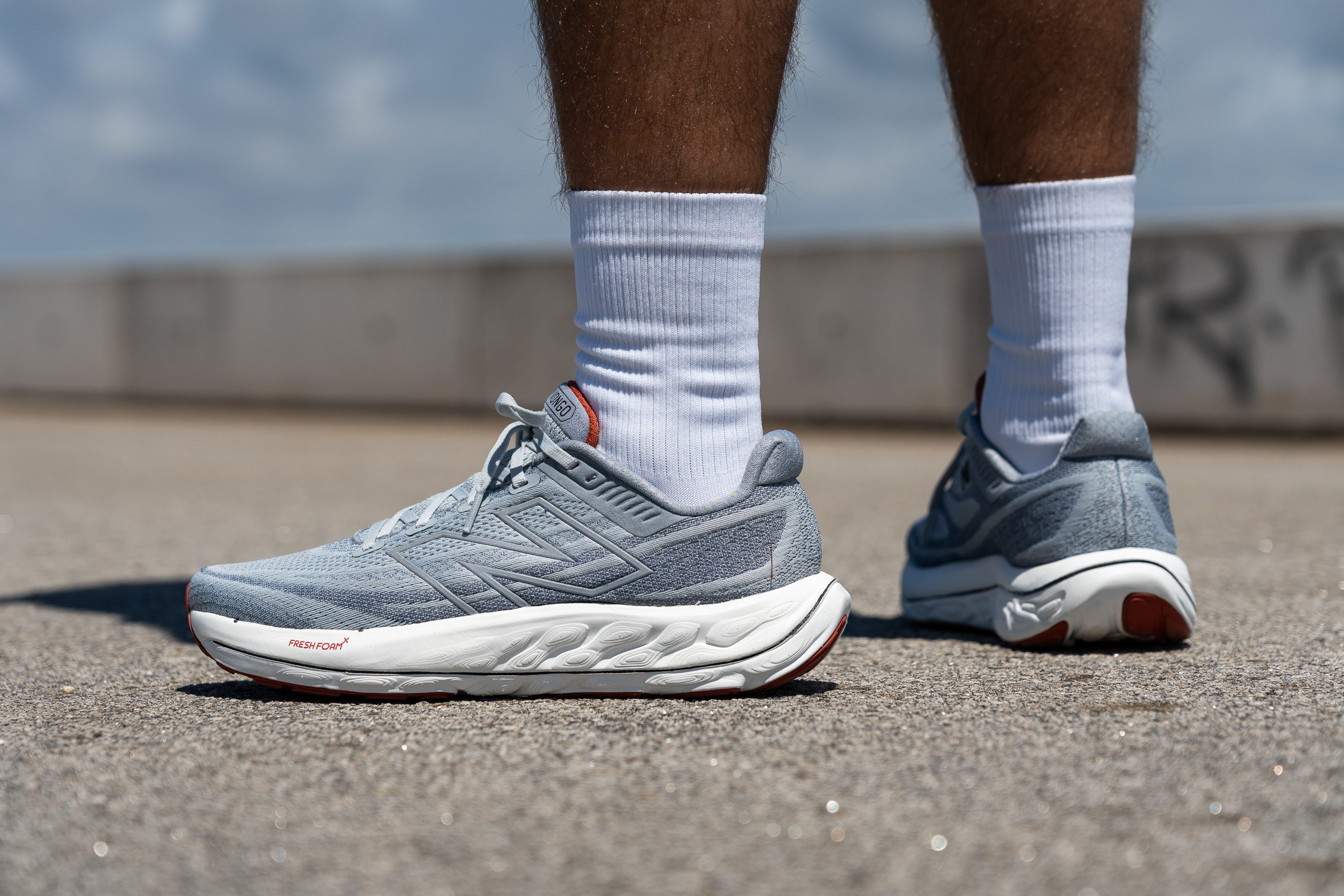
Who should NOT buy
We're under the impression that the New Balance Fresh Foam X Vongo v6, while a solid shoe, may not completely satisfy those loyal to its earlier versions due to its revamped features—including a novel EVA plate. For those seeking a traditional stability experience with a single layer of foam and no plates, we highly recommend the ASICS Gel Kayano 30.
Furthermore, we've noted that the Vongo v6's weight, exceeding 10 ounces, could be a deterrent for runners prioritizing a lightweight ride. In this case, we suggest considering the Hoka Arahi 7 for its exceptionally light build or the Saucony Guide 17 for outstanding balance and support.
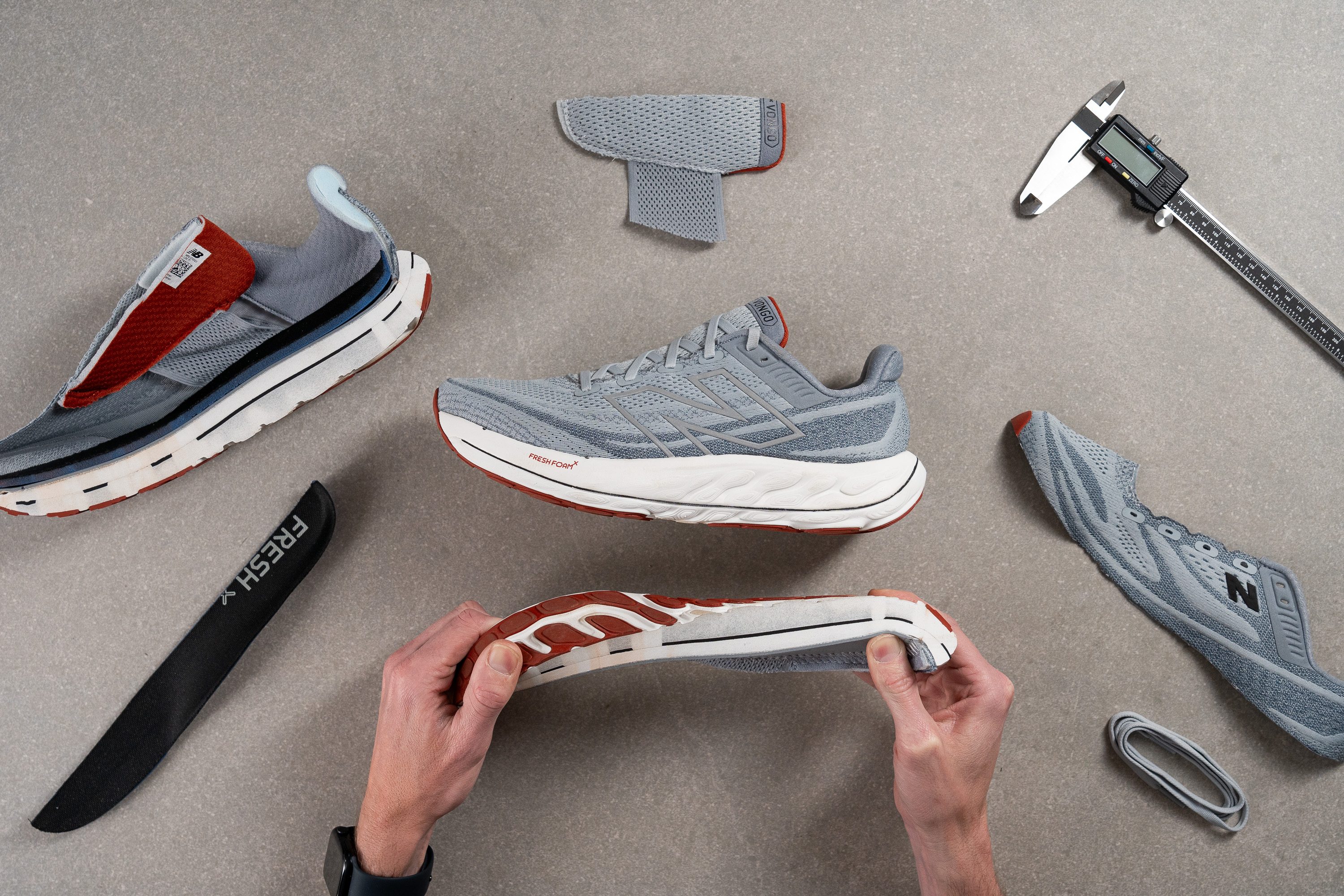
Cushioning
Shock absorption
The Vongo v6 comes with a thick midsole, so we were surprised to find below-average shock absorption at just 119 SA in the heel. Meanwhile, the forefoot performed slightly better, reaching 108 SA.
Should you worry about this? Not unless you’re a heavier heel striker aiming for long runs—then it might fall short of expectations and you can check something like the 1080 v14 instead.
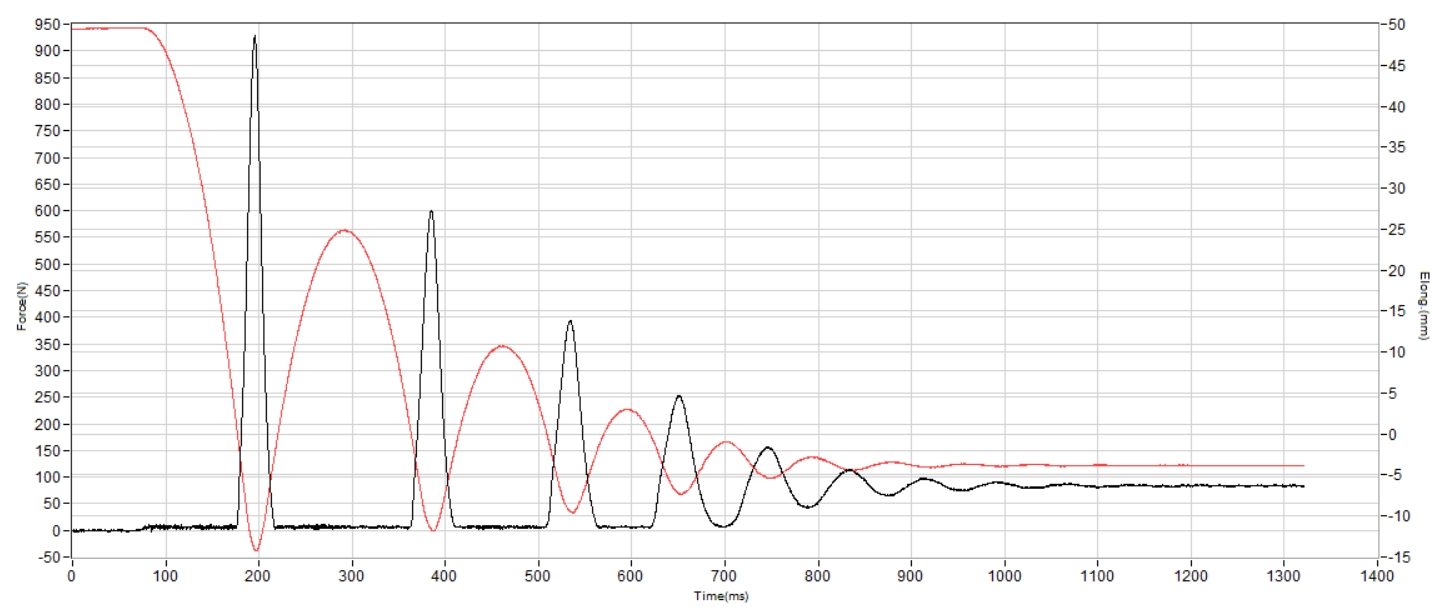
| Fresh Foam X Vongo v6 | 119 SA |
| Average | 130 SA |
Energy return
The Fresh Foam X midsole didn’t impress in our lab tests. It felt somewhat dull and lacked bounce—something confirmed by the 54.7% energy return we recorded during our evaluation.
| Fresh Foam X Vongo v6 | 54.7% |
| Average | 58.6% |
Heel stack
Boasting a substantial 36.1 mm heel height, the Vongo v6 now firmly stands in the max-stack category of stability shoes.
This thick cushioning, we feel, is New's Balance's effort to cater to runners across the whole weight spectrum, including those on the heavier side.
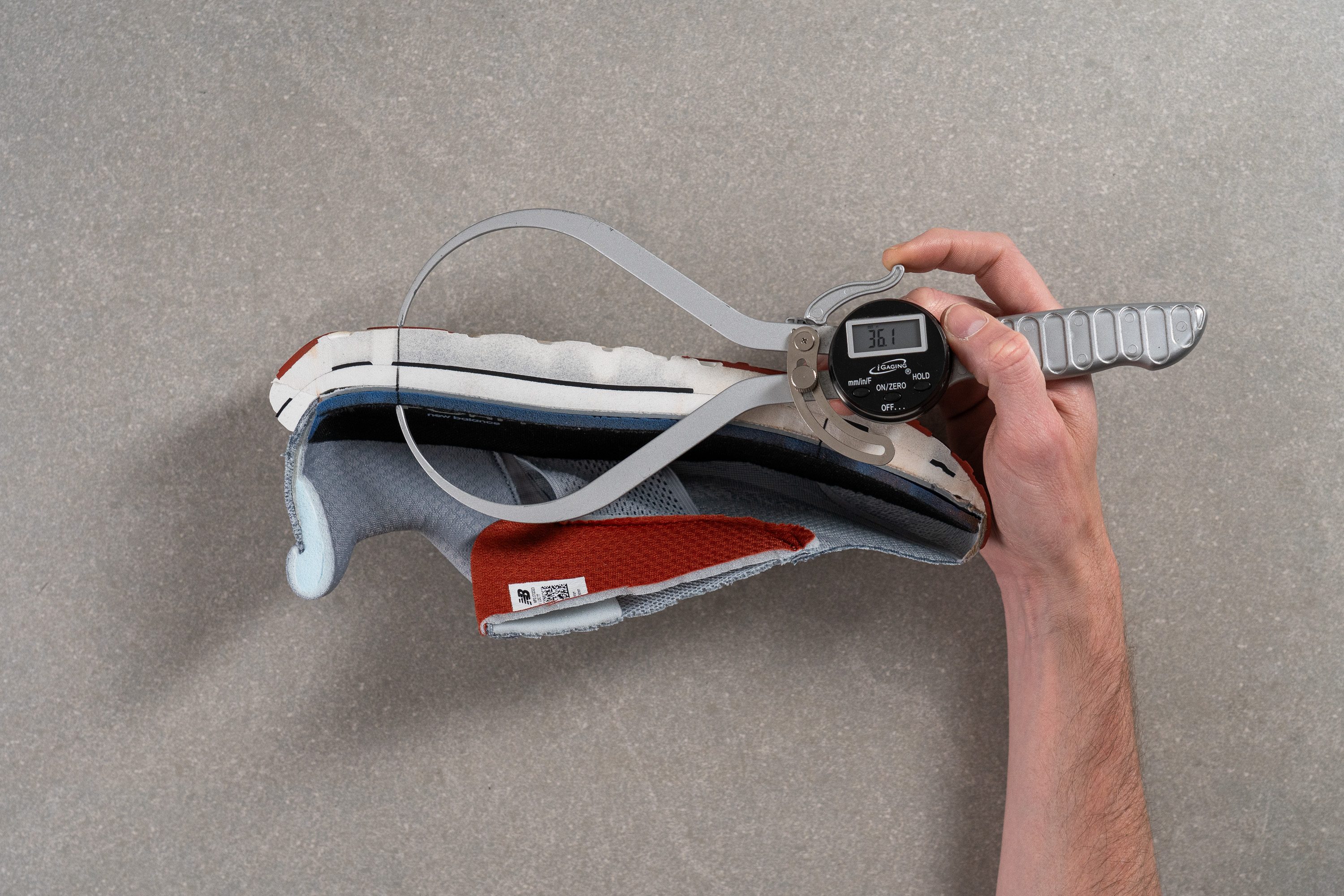
| Fresh Foam X Vongo v6 | 36.1 mm |
| Average | 34.8 mm |
Forefoot stack
The forefoot is exceptionally cushioned too, exceeding the 30-mm mark, ensuring that forefoot and midfoot strikers have ample foam for a comfortable and luxurious ride.
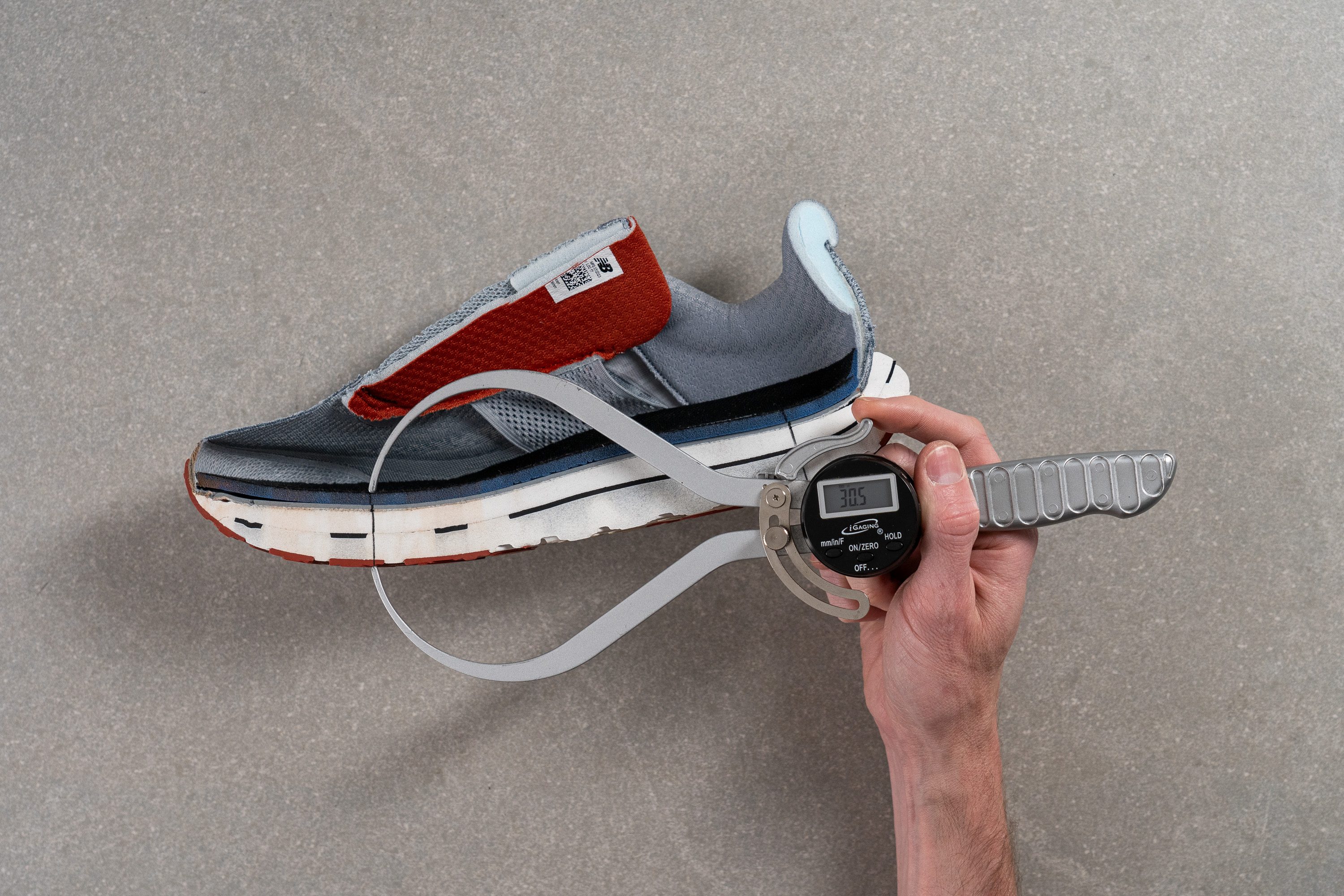
| Fresh Foam X Vongo v6 | 30.5 mm |
| Average | 26.2 mm |
Drop
New Balance advertises the Vongo v6 as having a moderate 6-mm drop, and our precise measurements, in accordance with World Athletics guidelines, showed a slight deviation at 5.6 mm.
This small discrepancy is likely just a result of manufacturing variations or the natural compression of the foam after our test runs. Absolutely nothing to worry about.
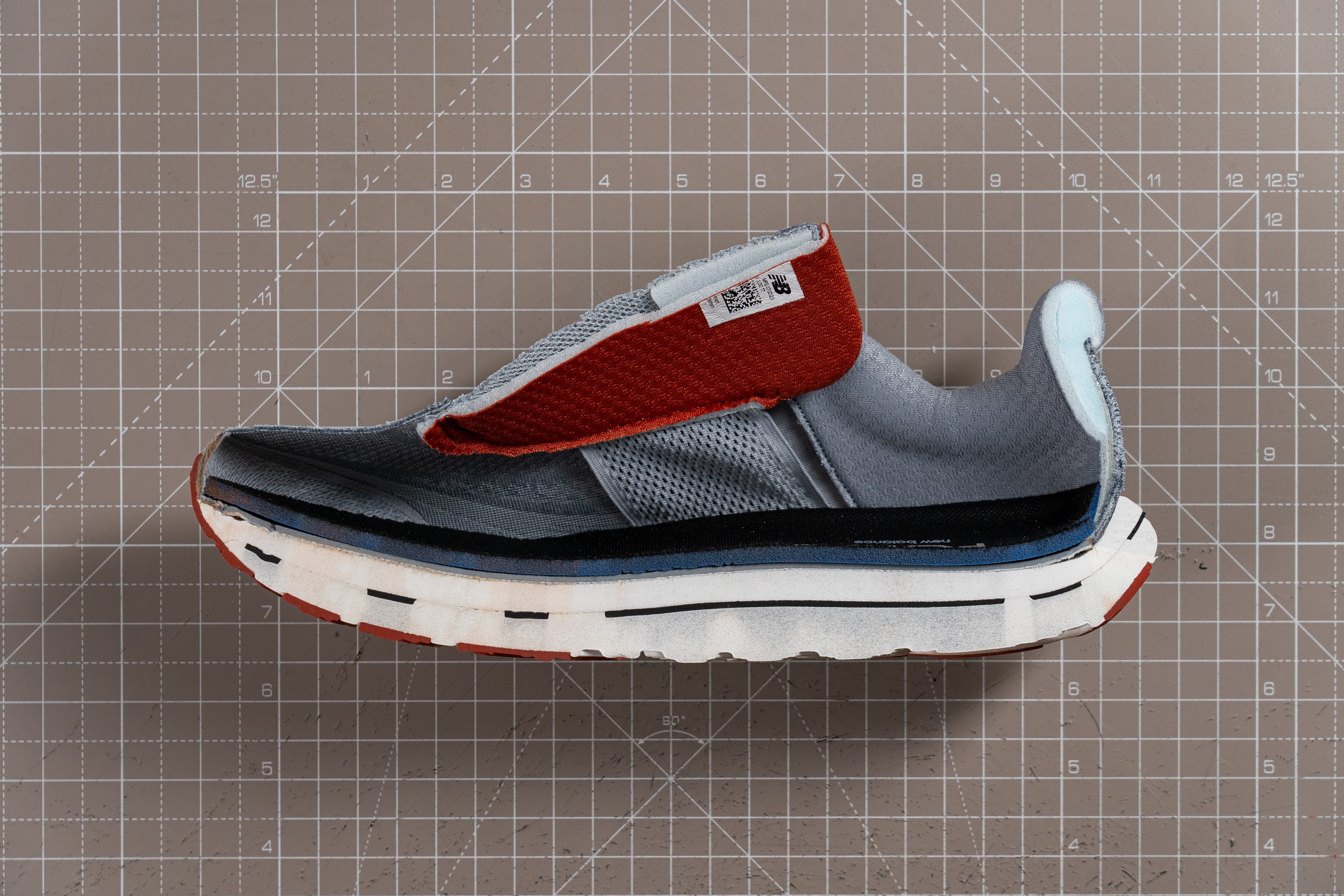
| Fresh Foam X Vongo v6 | 5.6 mm |
| Average | 8.6 mm |
Midsole softness
We're back to the midsole, and there's a lot to unpack. New Balance has shifted from a single-slab, simple layer of Fresh Foam X to a dual-density midsole with a plate in between.
For us, the primary layer is the one closest to the ground. We discovered that New Balance tweaked the Fresh Foam X formulation, making it almost twice as firm as their neutral running shoes. Our durometer reading was 18.9 HA, indicating that the ride is still somewhat plush but not overly soft like a 1080 v13.
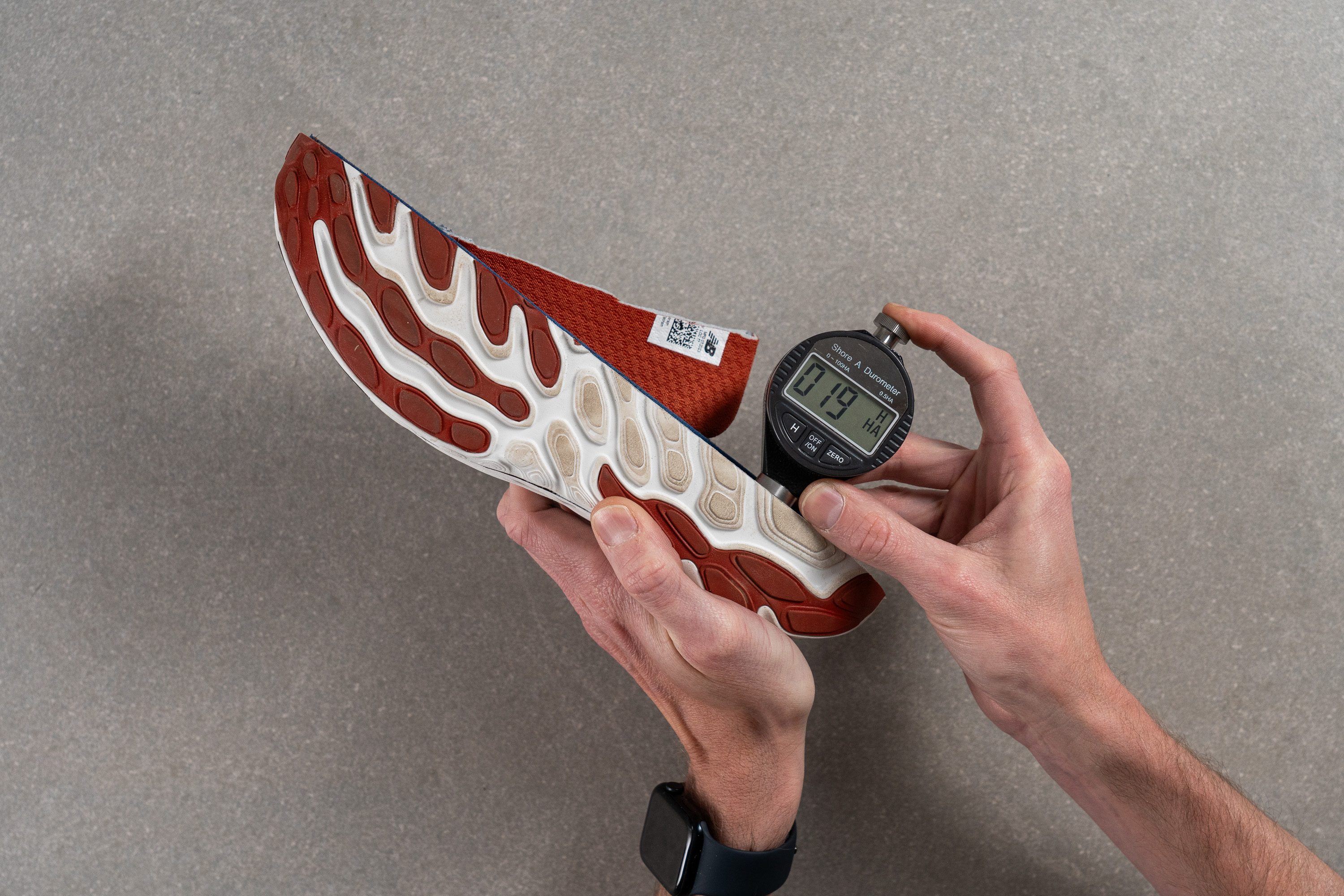
| Fresh Foam X Vongo v6 | 18.9 HA |
| Average | 20.4 HA |
Secondary foam softness
The other layer of Fresh Foam X is closer to the feet, and here, New Balance has used a bit less density to achieve a softer feel (15.8 HA), which makes sense. We believe that in a stability shoe, the right approach is this—a softer layer near the feet for comfort and a firmer layer closer to the ground for stability.
With that said, don't expect the ride to be ultra-stable like in hard-like-a-brick shoes. In running shoes, there are always trade-offs, and this is one of those.
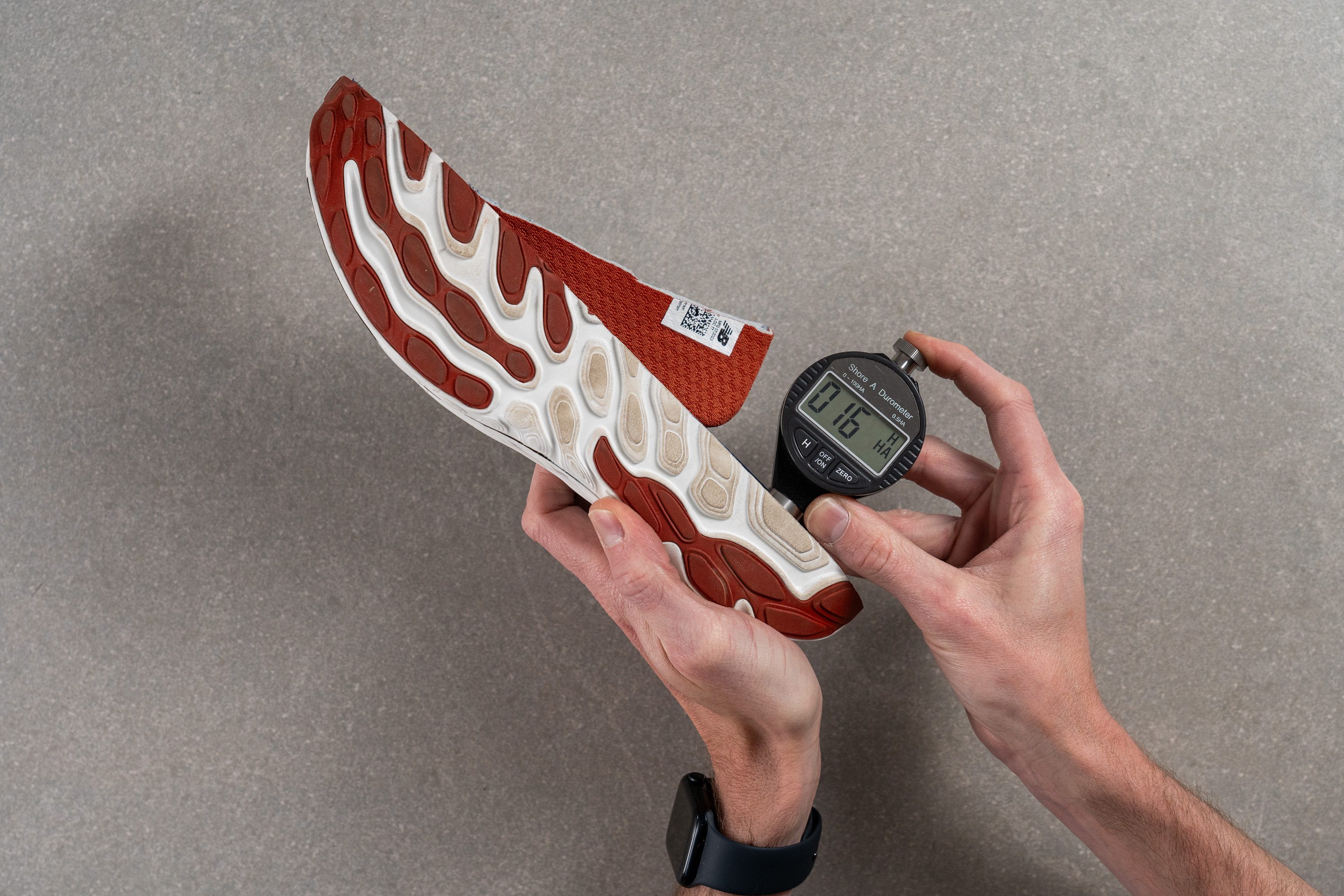
| Fresh Foam X Vongo v6 | 15.8 HA |
| Average | 22.7 HA |
Plate
One of the standout features of the Vongo v6 is the black "EVA film" plate sandwiched between the two layers of Fresh Foam X.
We found it to be a super-thin, 1.5 mm plate made from rock-hard EVA that acts as a stabilizing agent without adding too much longitudinal stiffness. And it works wonders in this all-new Vongo design.
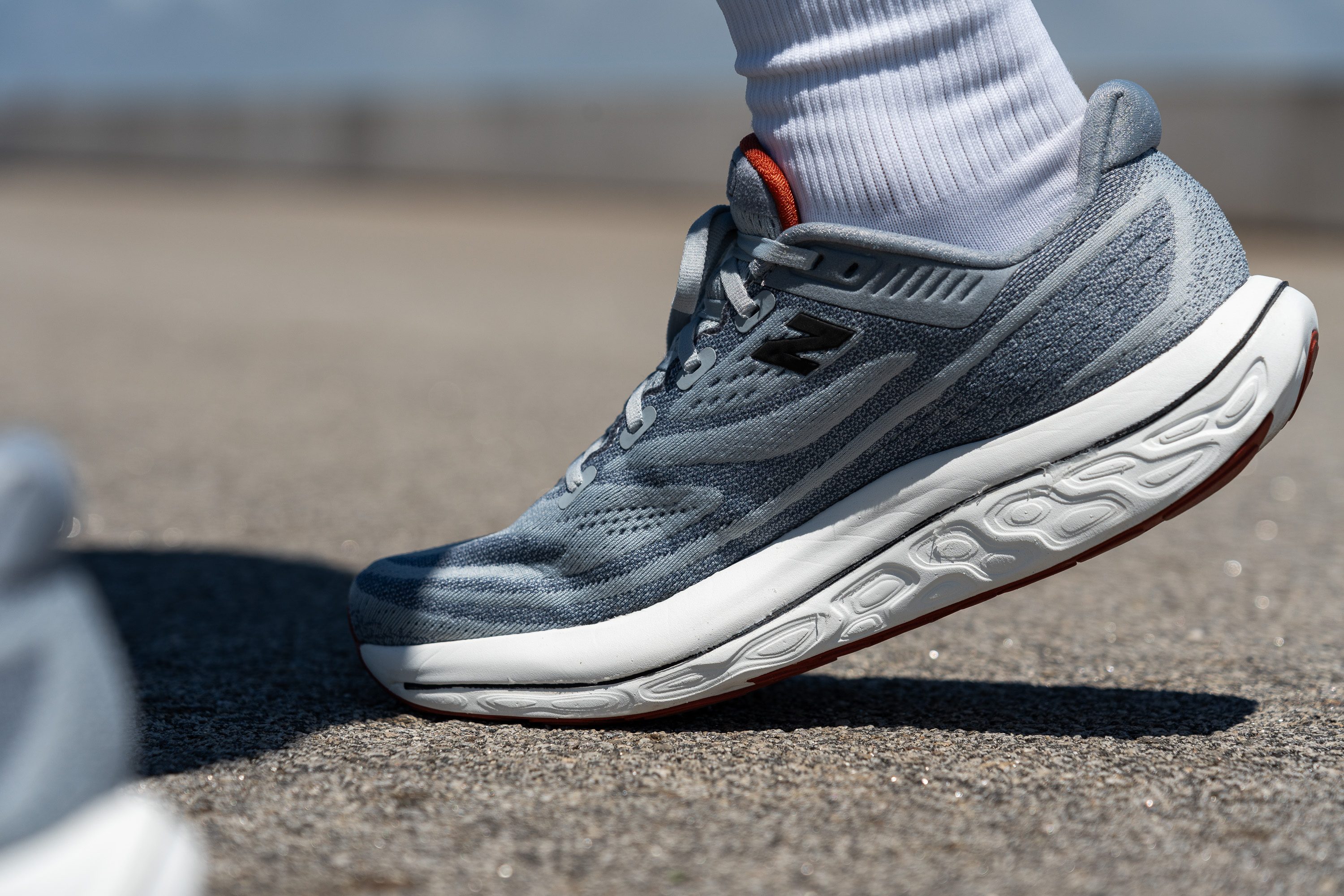
Size and fit
Size
New Balance Fresh Foam X Vongo v6 fits true to size (53 votes).
Internal length
| Fresh Foam X Vongo v6 | 272.7 mm |
| Average | 269.4 mm |
Width / Fit
New Balance often leans toward narrow, snug-fitting designs, but the Vongo v6 deviates slightly from this pattern, offering a bit more room without going into spacious territory.
We crafted a precise gel mold of the shoe's interiors and measured its widest point at 94.1 mm. While this measurement falls below the average, it remains versatile, accommodating runners with average-width feet comfortably.
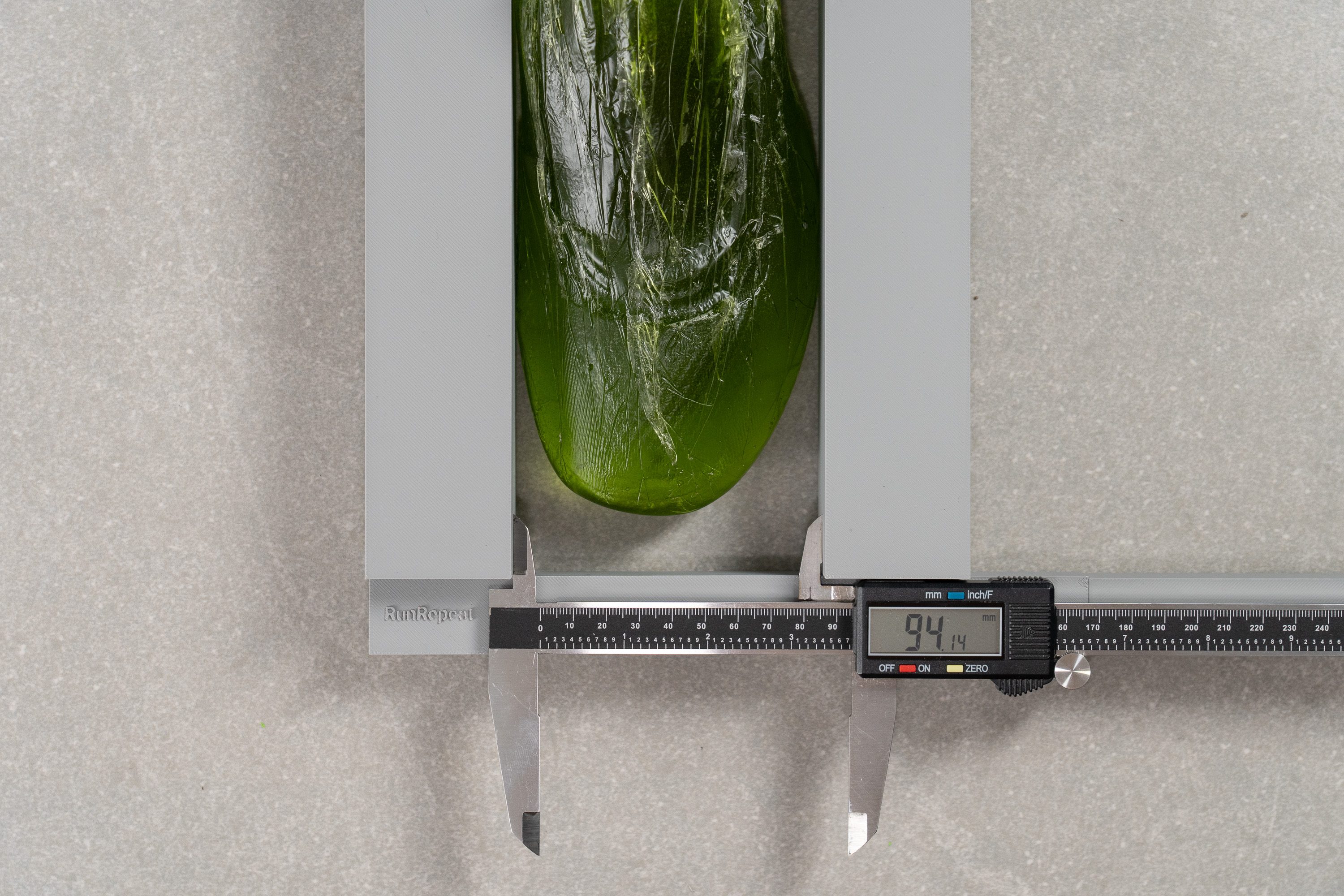
| Fresh Foam X Vongo v6 | 94.1 mm |
| Average | 95.1 mm |
Toebox width
We measured the width of the toebox to assess the toe cap's space. With a reading of 74.9 mm, it aligns with our previous findings.
Overall, it's slightly wider in this area than many other running shoes, but in standard width, it doesn’t qualify as a super-wide option for us based on these measurements. However, good news is that New Balance also offers this shoe in a wide size option in most countries.
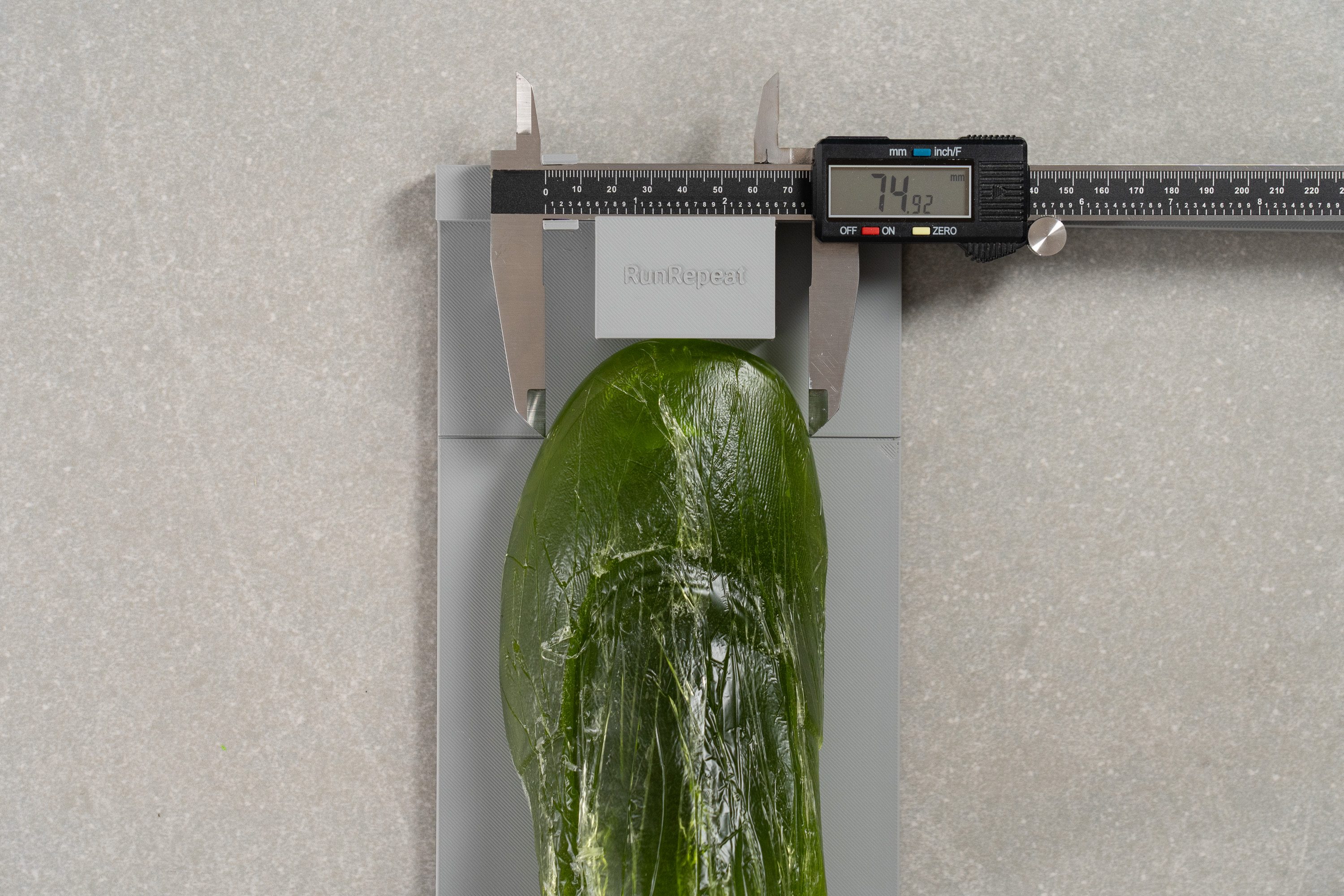
| Fresh Foam X Vongo v6 | 74.9 mm |
| Average | 73.3 mm |
Toebox height
At 27.4 mm, the toebox height offers a safe and accommodating design. And another average measurement!
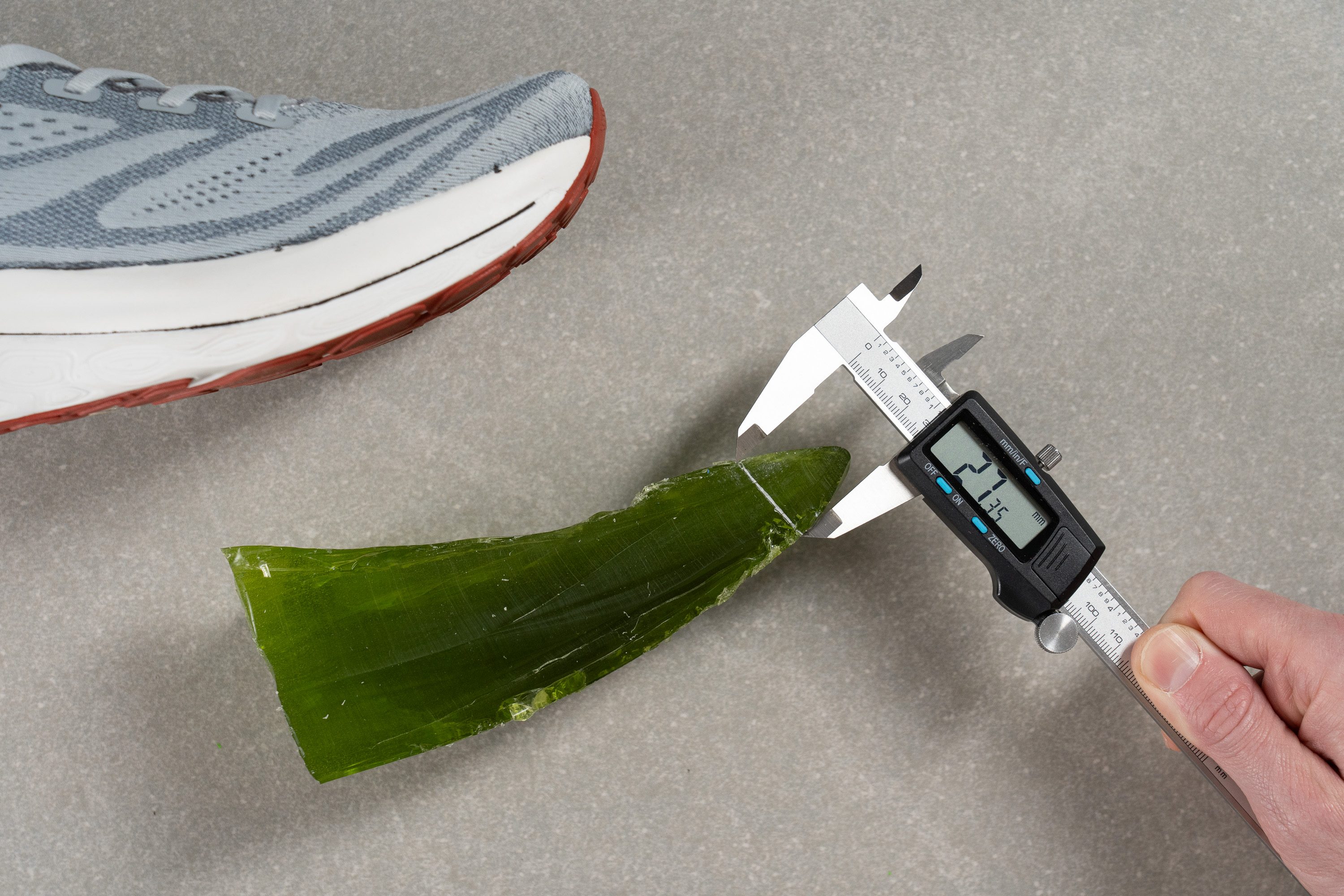
| Fresh Foam X Vongo v6 | 27.4 mm |
| Average | 27.0 mm |
Traction / Grip
Traction test
Checking the shoe's gripping capacity with a SATRA TM144 method, we discovered that the Vongo v6 offers a reliable grip on both dry and wet concrete.
Its coefficient of friction returned a solid reading of 0.48 which implies that you can navigate corners and hilly roads with confidence.
| Fresh Foam X Vongo v6 | 0.48 |
| Average | 0.49 |
Outsole design
The Vongo v6 stands out as a stability trainer, and its outsole reflects that intent. Rubber coverage is abundant especially on the medial side, offering structured support for overpronators. While the heel and forefoot are fully protected, New Balance still left small midfoot gaps to reduce some bulk.
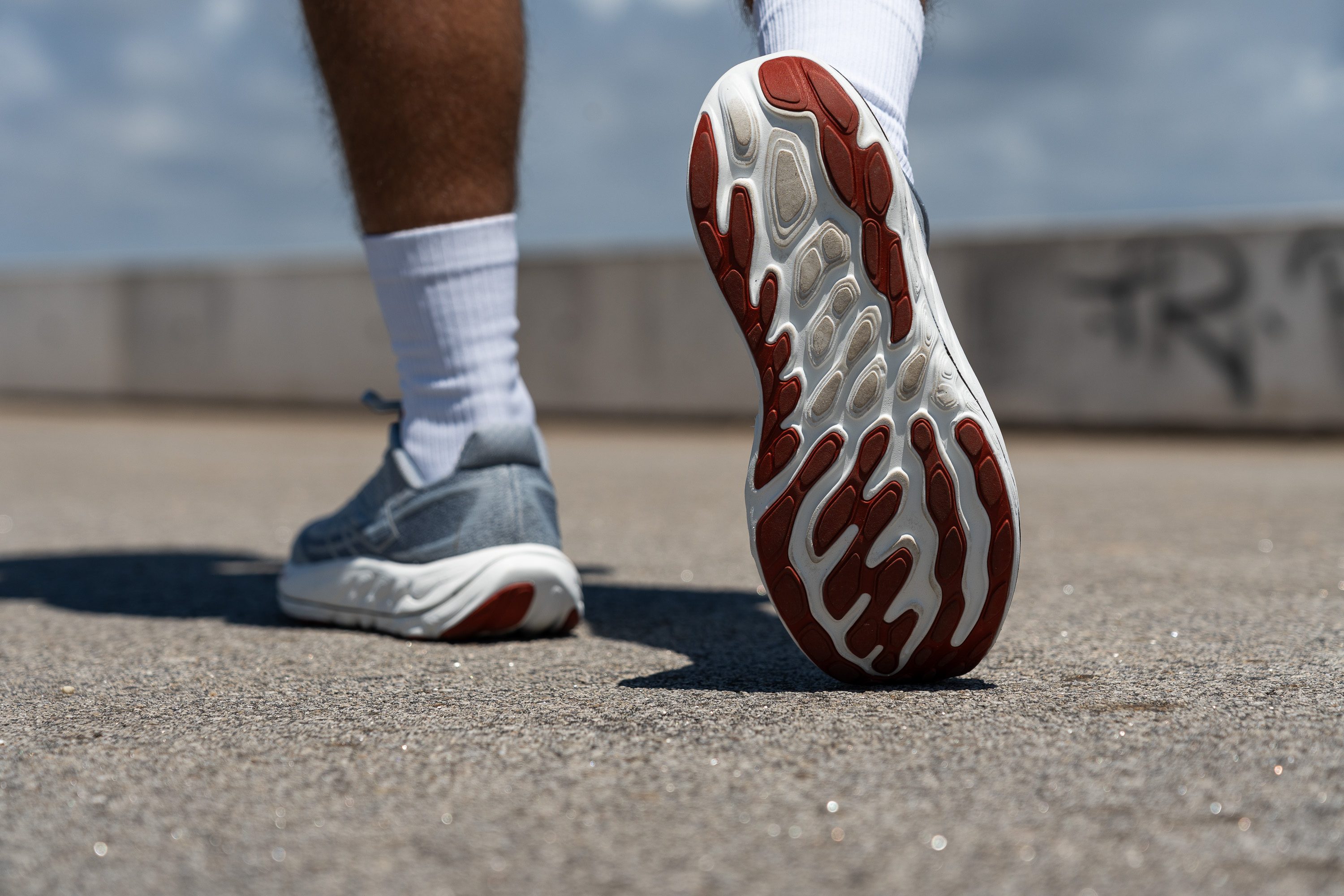
Flexibility / Stiffness
Stability shoes are usually very rigid, but we knew from the start that New Balance aimed to make this shoe as flexible as possible to keep it comfortable in various activities and easy runs.
The outsole grooves, the plastic plate instead of a rigid one, and the midsole design all contribute to creating a moderately-flexible stability shoe. It’s even less stiff than some neutral daily trainers like the ASICS Novablast 5.
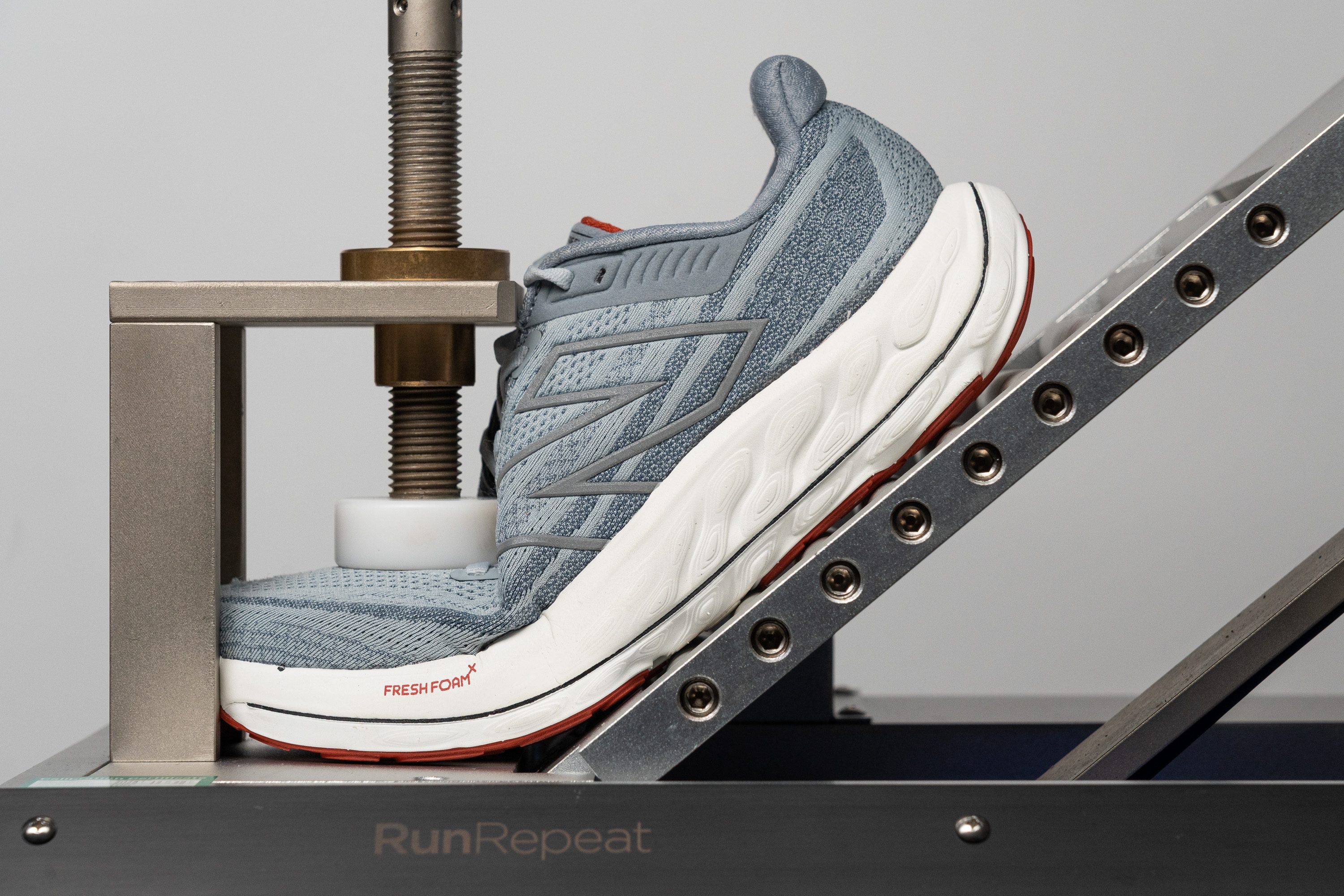
| Fresh Foam X Vongo v6 | 15.3N |
| Average | 15.3N |
Weight
Right out of the box—and on our first run with the Vongo v6—we couldn't ignore its weight. Tipping the scales at 11.0 oz or 312g, it's clearly not aiming for the lightweight stability shoe category.
For those unconcerned with a heavier shoe, the Vongo v6 excels in nearly every other department. However, for runners for whom weight is a critical factor, this could be a deal breaker.
Oh, and we really believe New Balance has the capability to reduce the weight in future iterations of the Vongo to under 10 ounces—so we certainly hope they will.
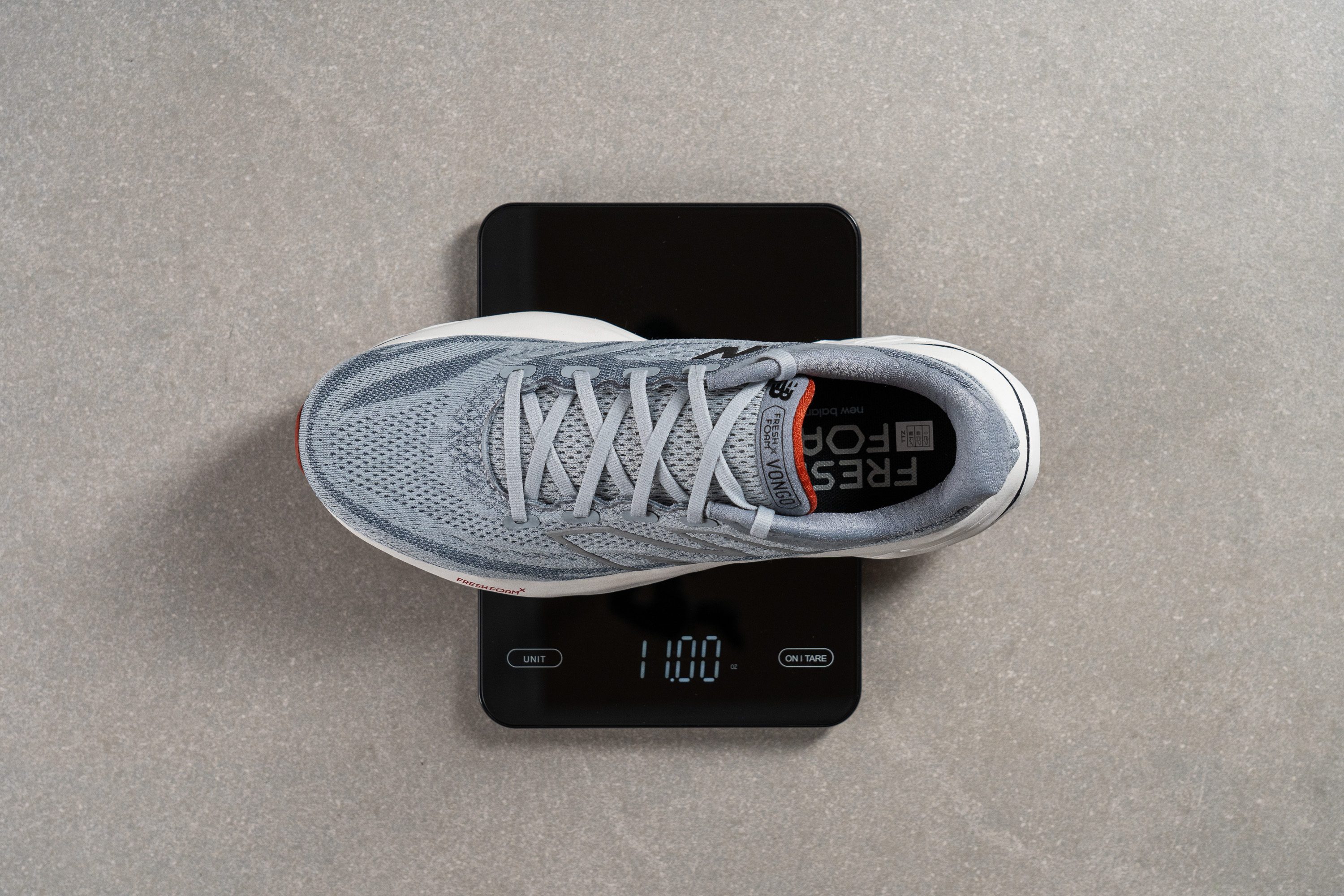
| Fresh Foam X Vongo v6 | 11.0 oz (312g) |
| Average | 9.3 oz (264g) |
Breathability
At first look, it appeared to us that New Balance designed the Vongo v6 with an abundance of ventilation holes. However, our practical tests using a smoke-pumping machine were underwhelming, and lead us to assign a disappointing rating of just 1 out of 5.
When we shone a light through the shoe, we discovered a thick engineered knit.
Curious about this, we turned to our microscope for a closer examination.
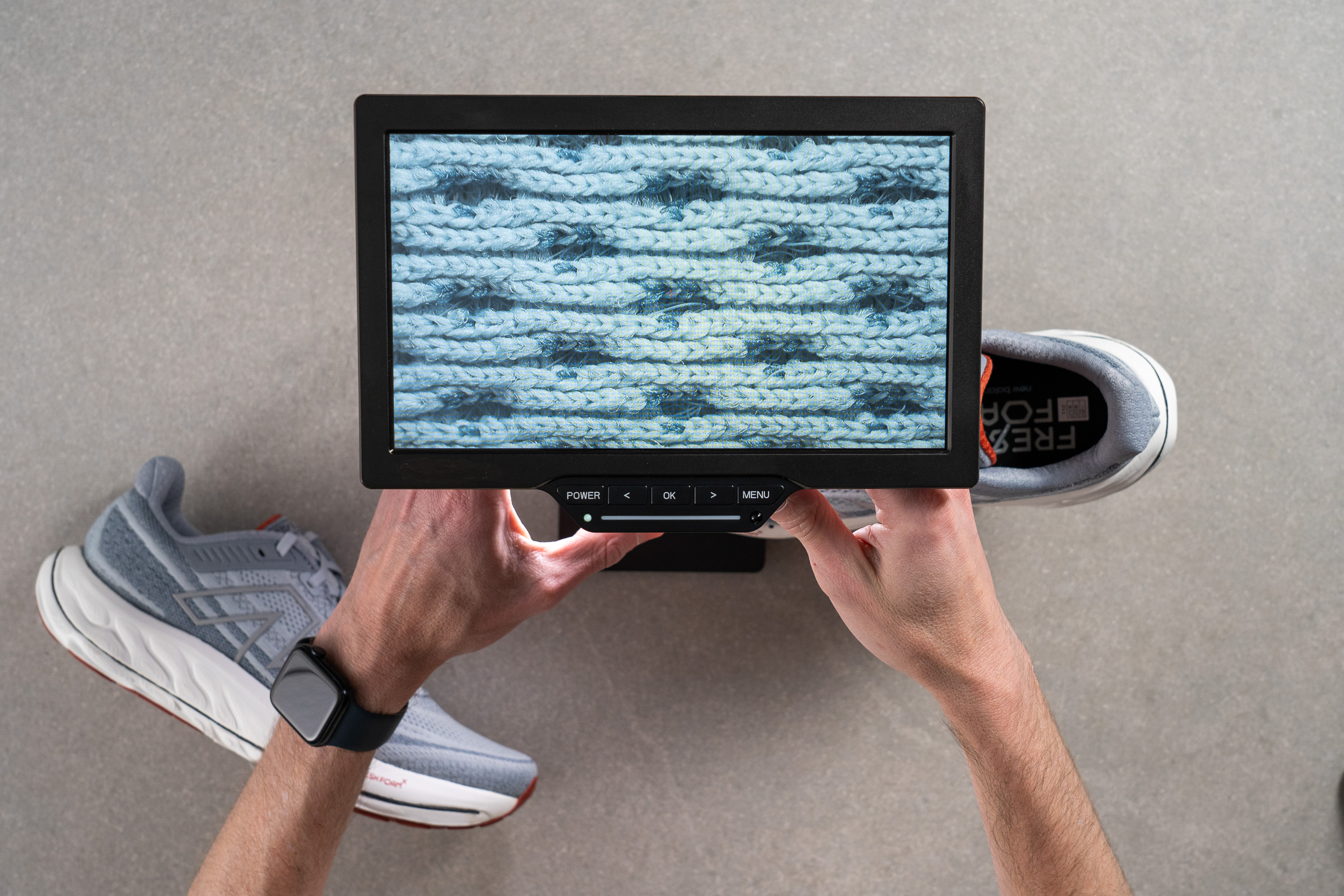
Here, we confirmed the exceptionally thick knit material. While this upper offers incredible comfort and is ideal for cooler conditions, we think it's less suitable for warmer weather.
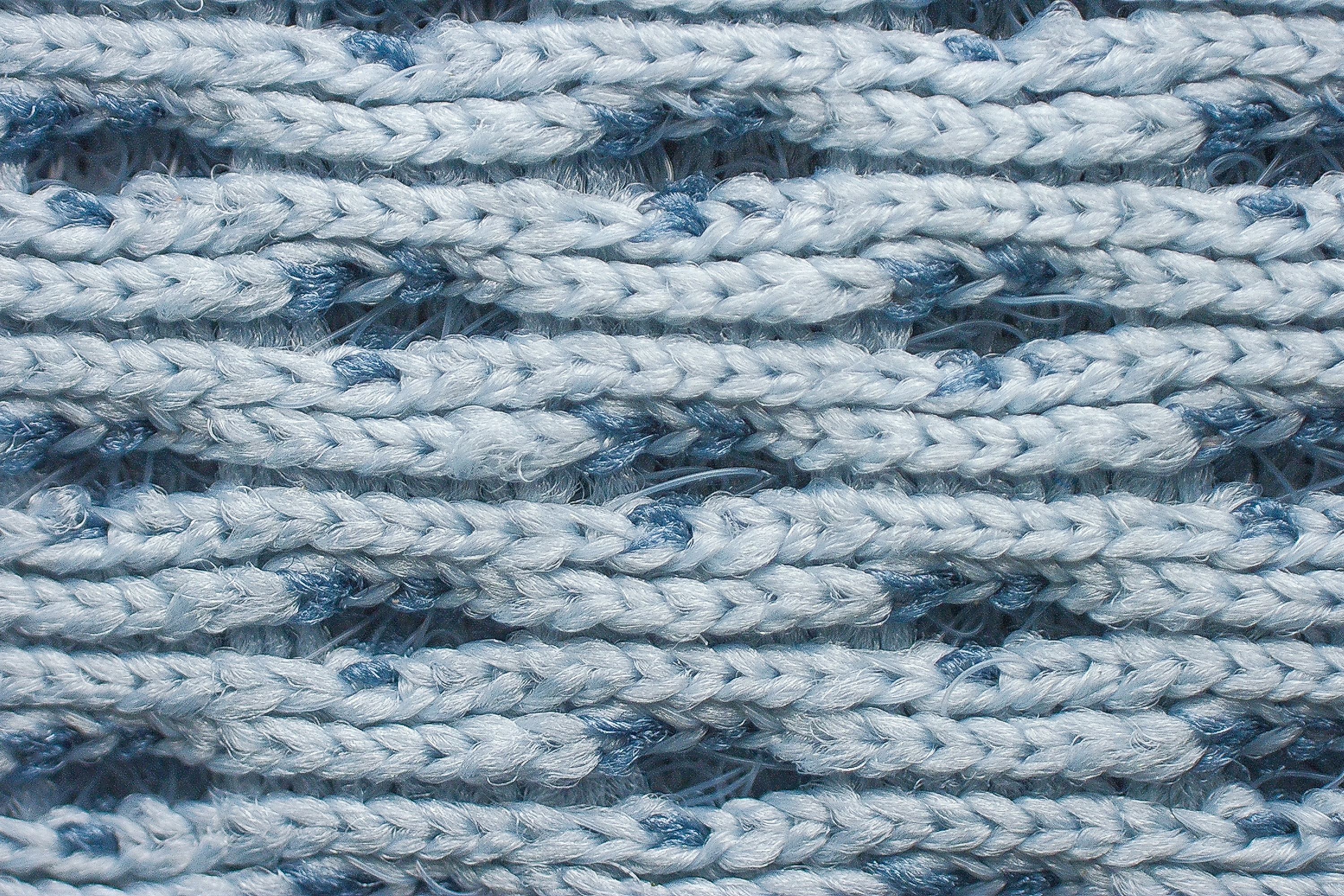
Our evaluation also revealed that the upper part of the shoe snugly wraps around the foot, providing stretch and comfort with a feel of high-quality material.
Nonetheless, it clearly lacks in terms of ventilation, as previously demonstrated. From our perspective, there is significant potential for enhancing airflow in the Vongo v7.
| Fresh Foam X Vongo v6 | 1 |
| Average | 3.7 |
Stability
Lateral stability test
The Vongo has traditionally been a stability shoe within the New Balance range, yet here from the lab, the distinction between neutral trainers and mild-stability footwear is increasingly blurring. This trend is evident with the Vongo v6, which perfectly suits neutral runners while still offering adequate support for those with low to moderate stability needs.
However, for those with more pronounced pronation issues, while the Vongo might suffice, we believe opting for a stiffer, dedicated stability shoe like the Hoka Gaviota 5 is a smarter choice.
Torsional rigidity
We discovered that the Vongo v6 offers exceptional comfort underfoot, largely because it features less torsional rigidity than typical stability shoes, scoring a moderate, daily-trainer-like 3/5 in our evaluations.
| Fresh Foam X Vongo v6 | 3 |
| Average | 3.5 |
Heel counter stiffness
We tested the stiffness of the heel counter and discovered that New Balance has strategically increased its rigidity to enhance stability, particularly benefiting heel strikers.
We rate this feature a solid 4/5—it appears to be a smart adjustment for the Vongo based on our knowledge.
| Fresh Foam X Vongo v6 | 4 |
| Average | 2.9 |
Midsole width - forefoot
With a moderate 6-mm drop and substantial cushioning under the forefoot, New Balance had to ensure ample width to prevent lateral foot collapse.
We measured the forefoot at its widest point—118.3 mm—and were pleased with the generous design.
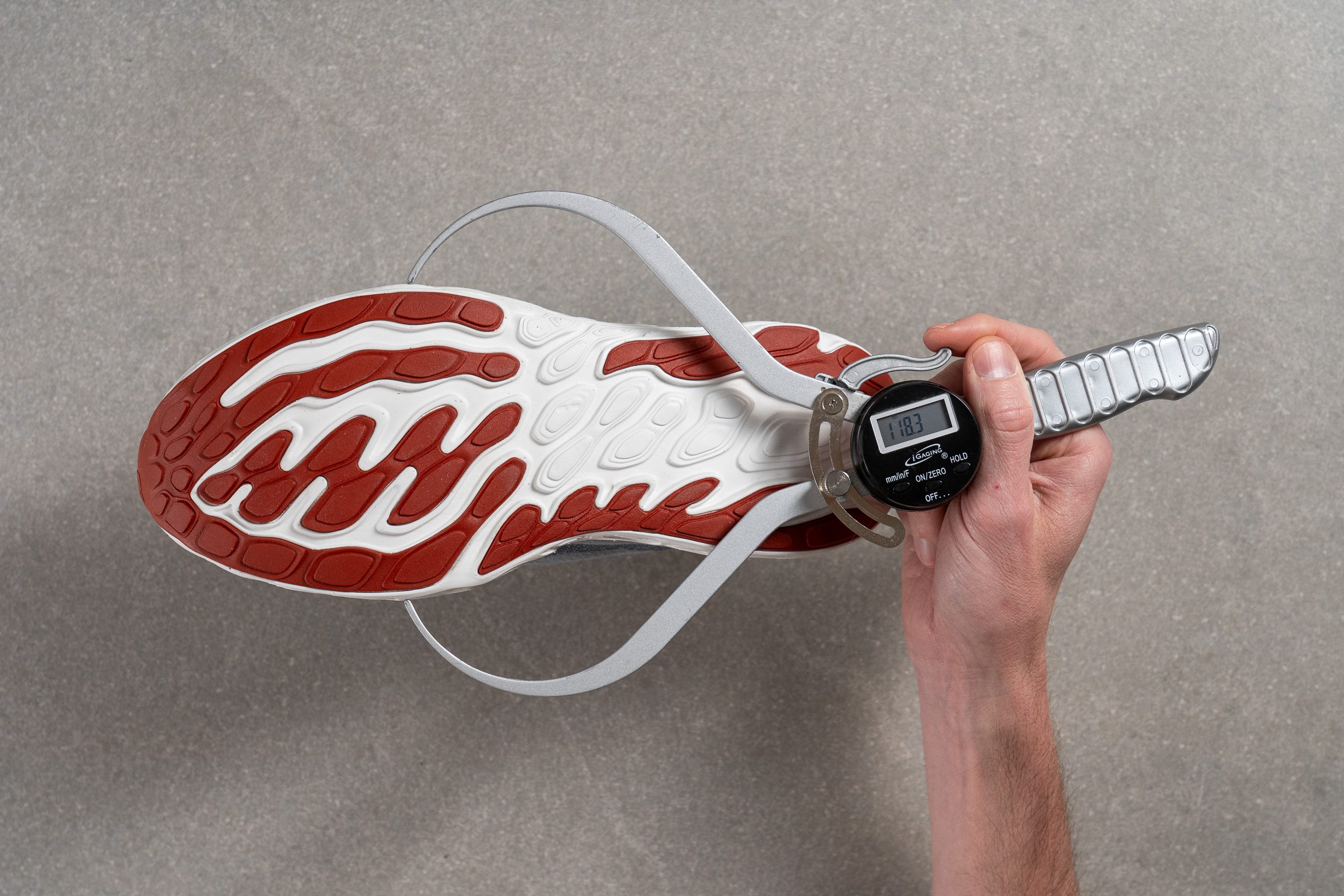
| Fresh Foam X Vongo v6 | 118.3 mm |
| Average | 114.4 mm |
Midsole width - heel
The heel width of 91.7 mm doesn't feel as substantial compared to other competitors, aligning more with the dimensions of an average trainer. This dimension suggests that with its moderate drop, the shoe primarily supports midfoot strikers rather than heel strikers.
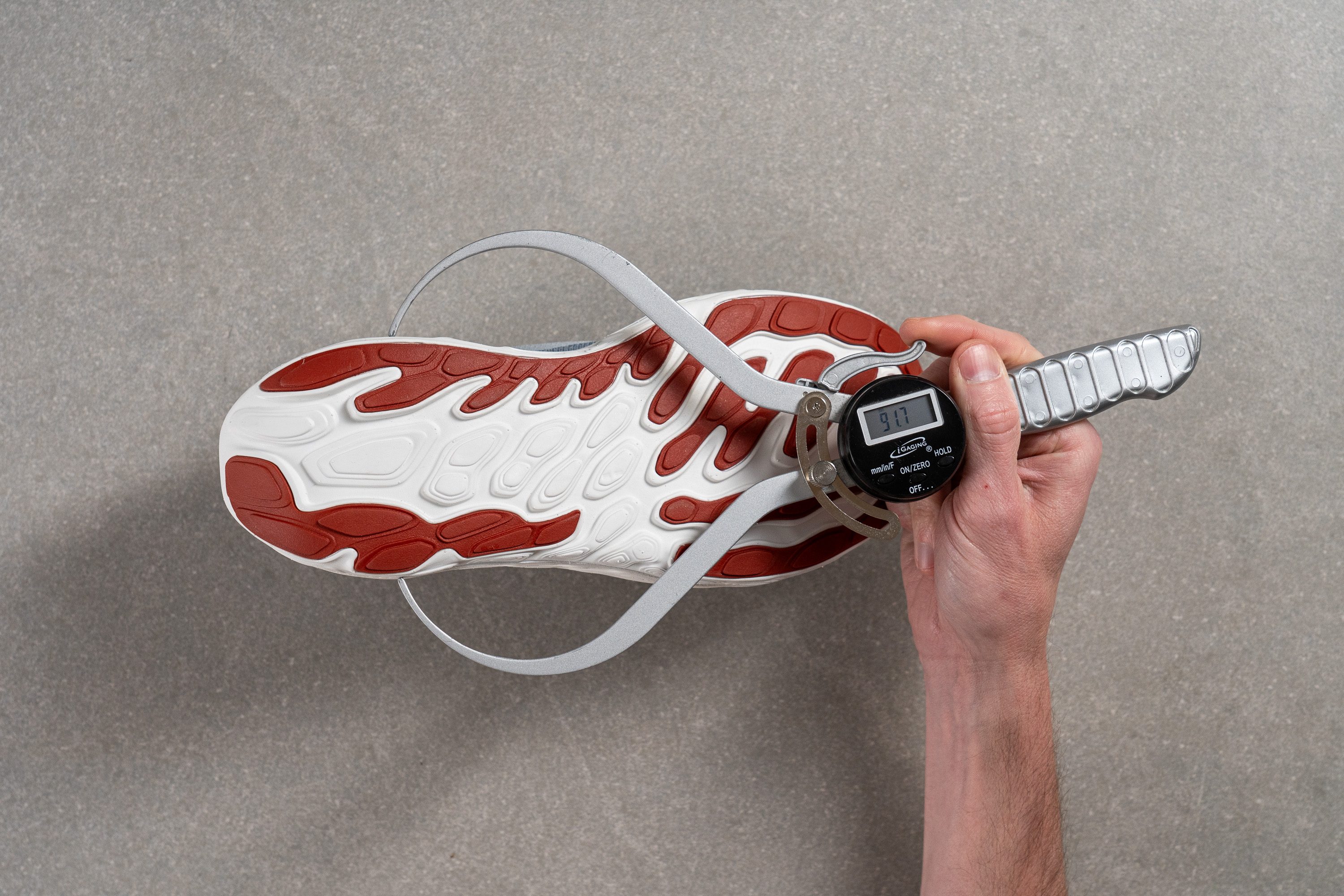
| Fresh Foam X Vongo v6 | 91.7 mm |
| Average | 90.6 mm |
Durability
Toebox durability
In our lab tests, knit uppers usually don't fare well against the rigorous Dremel challenge—however, the Vongo v6 was a standout exception.
Impressively, it sustained minimal damage and earned a good score of 3/5 from us, a remarkable achievement for such a soft, engineered knit upper.
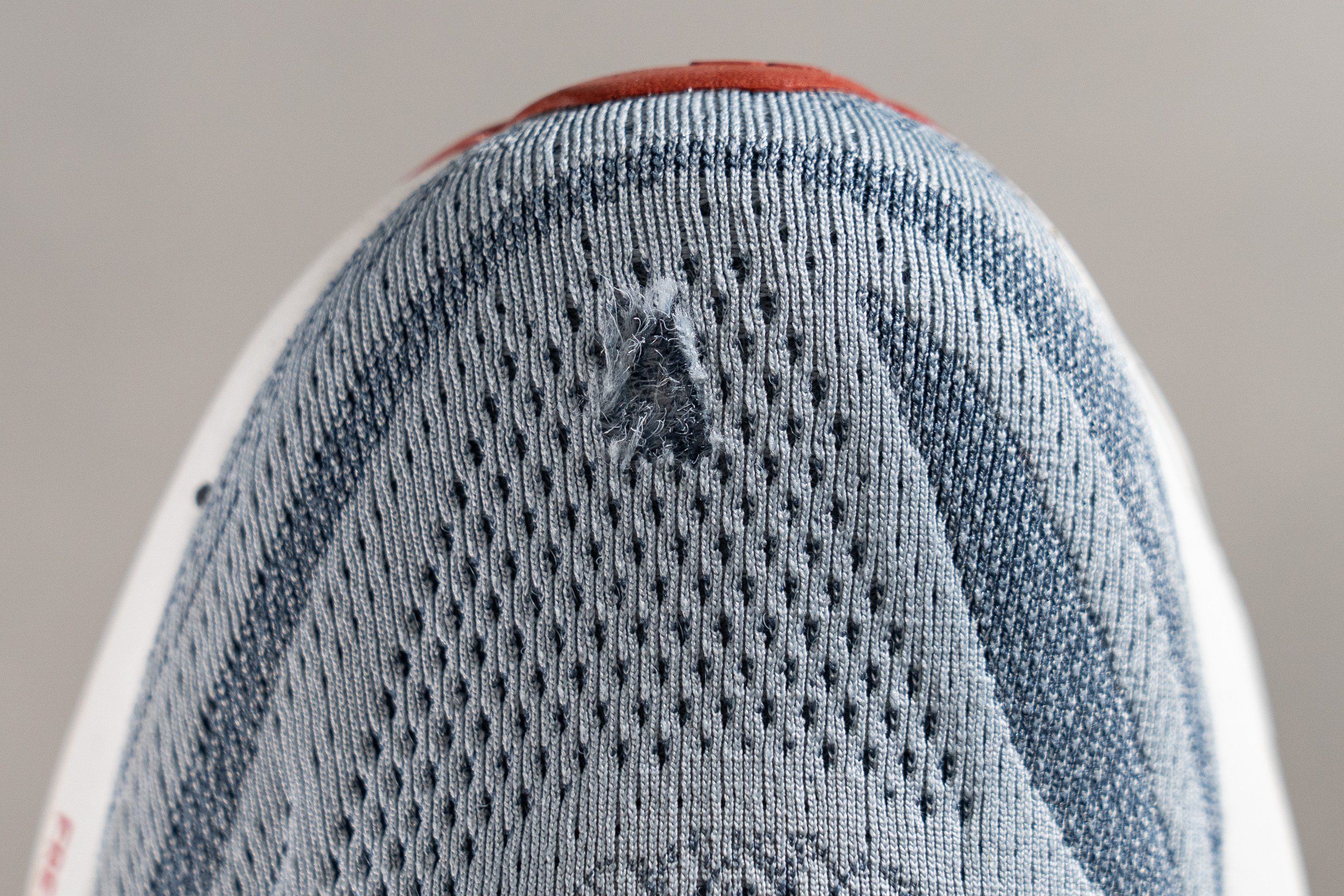
| Fresh Foam X Vongo v6 | 3 |
| Average | 2.6 |
Heel padding durability
During our second rigorous Dremel test, we put the Vongo's heel padding to the test—an area that often wears out quickly for many runners.
Impressively, the heel padding showed remarkable resilience, scoring a strong 4/5. This result equals robust protection that can withstand even the roughest socks, highlighting an improvement in durability over the toebox.
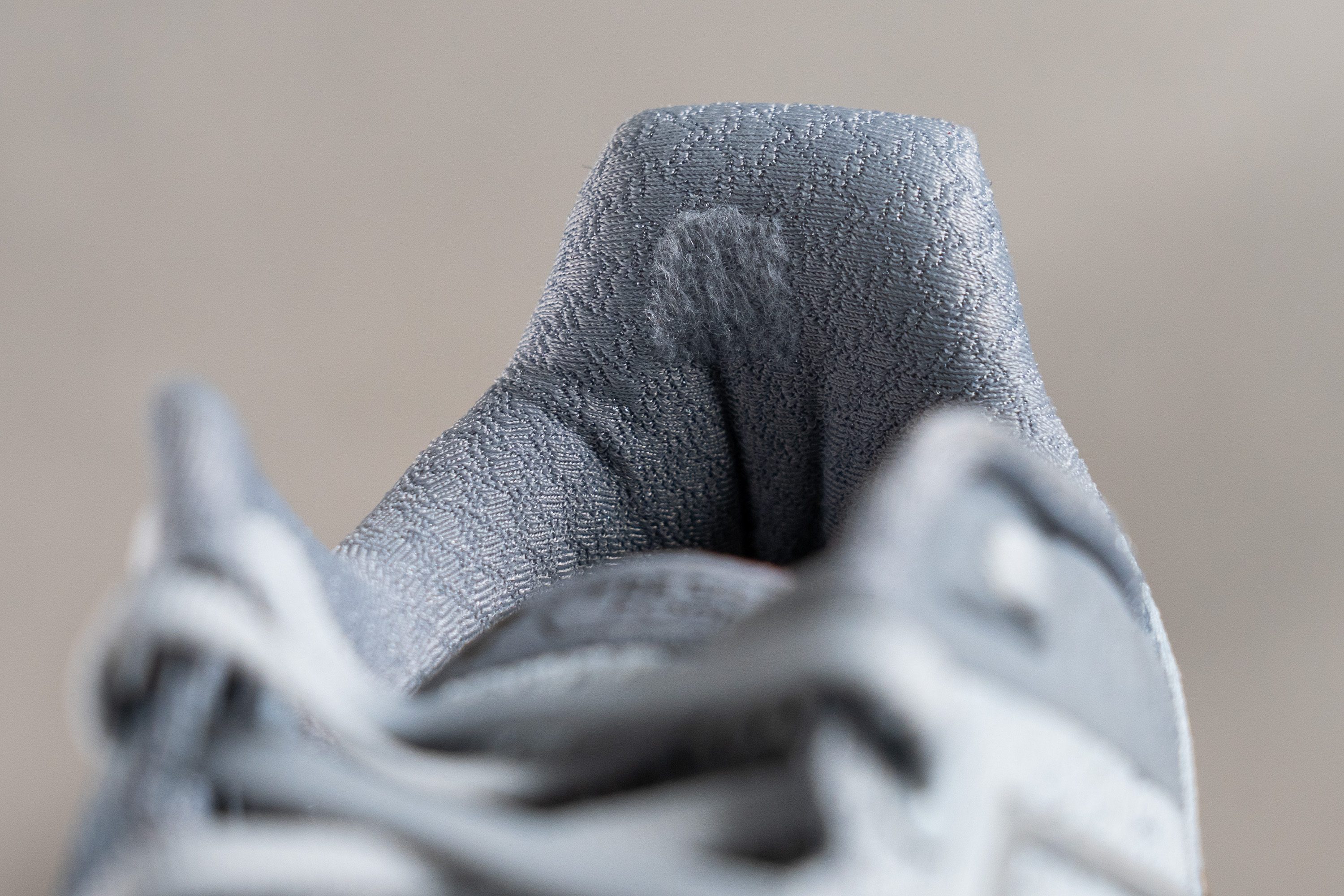
| Fresh Foam X Vongo v6 | 4 |
| Average | 3.4 |
Outsole durability
Next, we put the blown rubber to the test with our Dremel, exerting more speed (10K RPM) and duration than used on the shoe's upper—necessary given the material's toughness.
The outsole showed a minimal wear of only 0.7 mm, affirming its durability. Even for runners who pronate heavily, this outsole promises long-lasting performance without wearing down quickly.
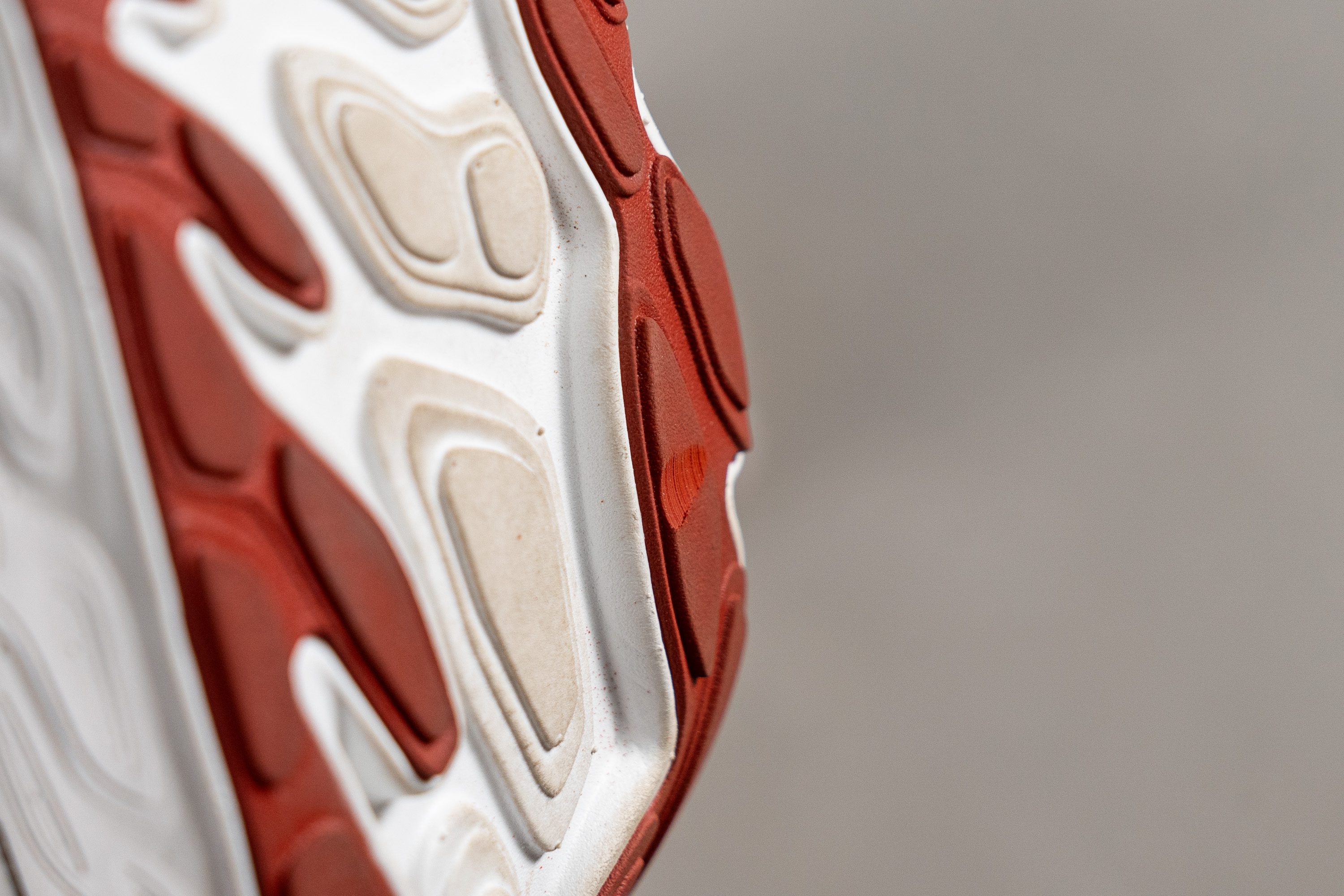
| Fresh Foam X Vongo v6 | 0.7 mm |
| Average | 1.1 mm |
Outsole thickness
To boost even more its durability, New Balance has generously incorporated 3.5 mm of rubber in the Vongo v6.
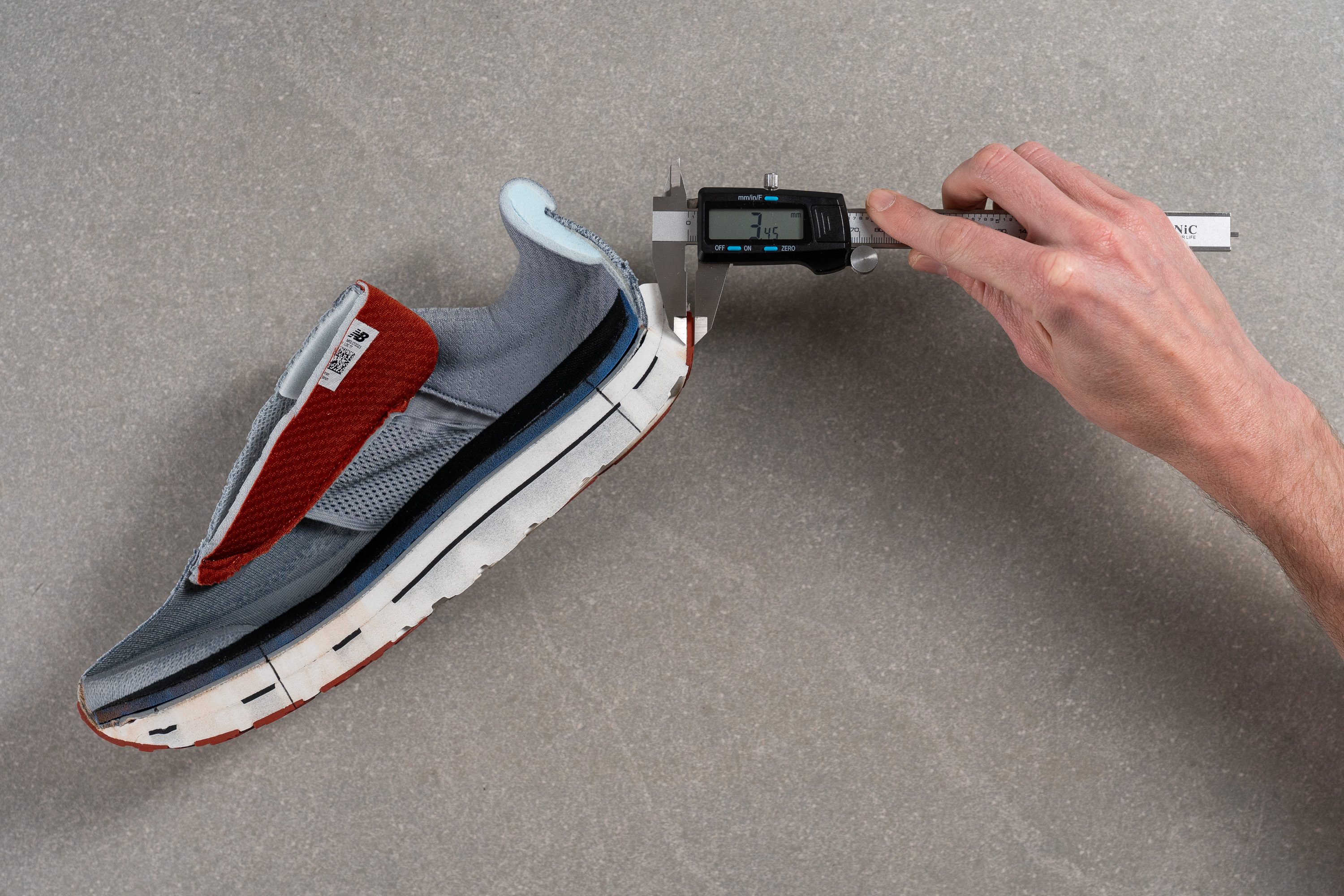
| Fresh Foam X Vongo v6 | 3.5 mm |
| Average | 3.2 mm |
Misc
Insole thickness
We found that the 4.9 mm thick insole significantly enhances the softness of the ride.
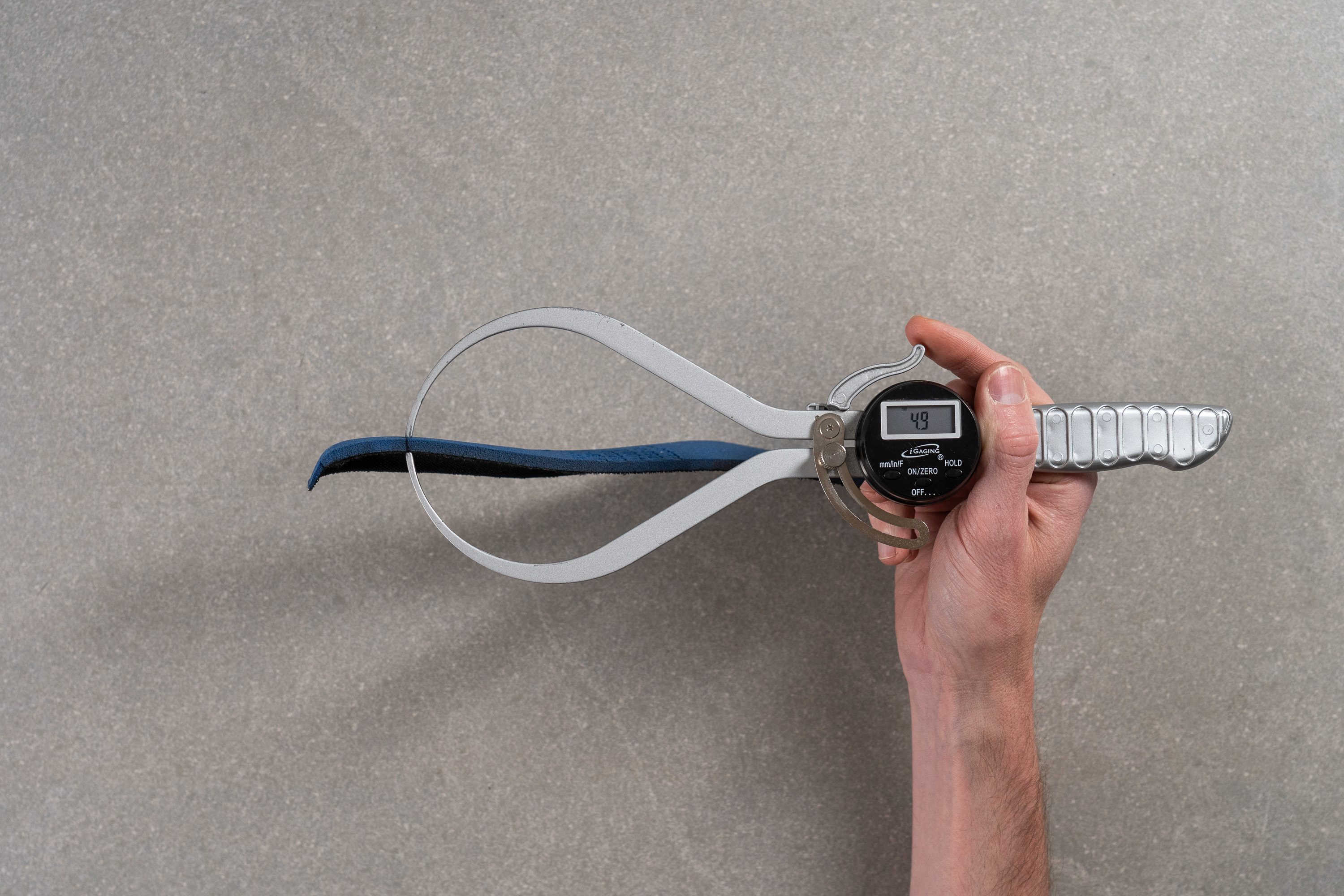
| Fresh Foam X Vongo v6 | 4.9 mm |
| Average | 4.5 mm |
Removable insole
The insole isn't fixed with adhesive, which we applaud. This design allows for effortless swapping with custom orthotics or third-party insoles!
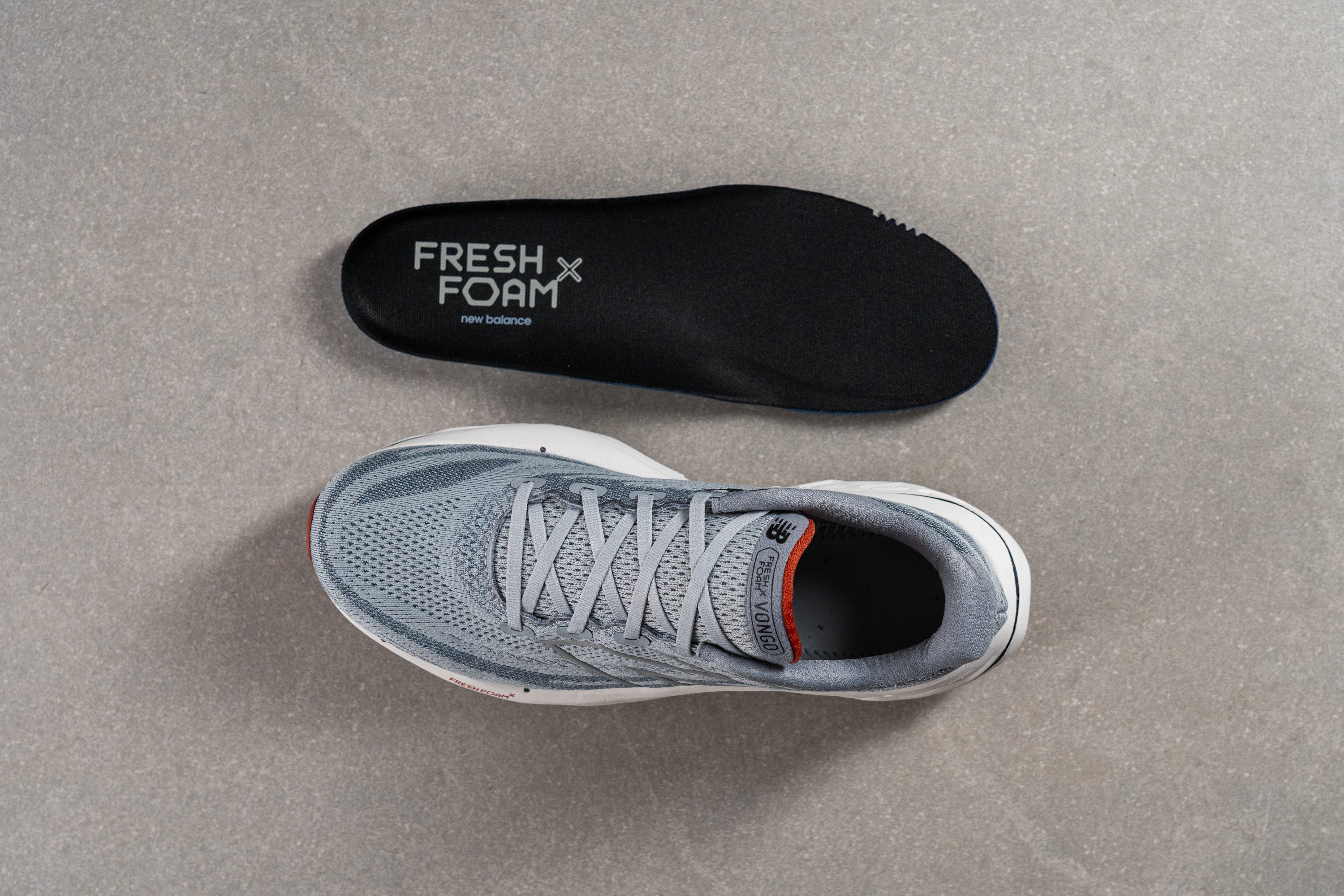
| Fresh Foam X Vongo v6 | Yes |
Midsole softness in cold (%)
Our 20-minute freezer test showed that the EVA midsole hardened by 27.1%, which is a decent outcome. This demonstrates how well the midsole retains its softness even in coldest conditions.
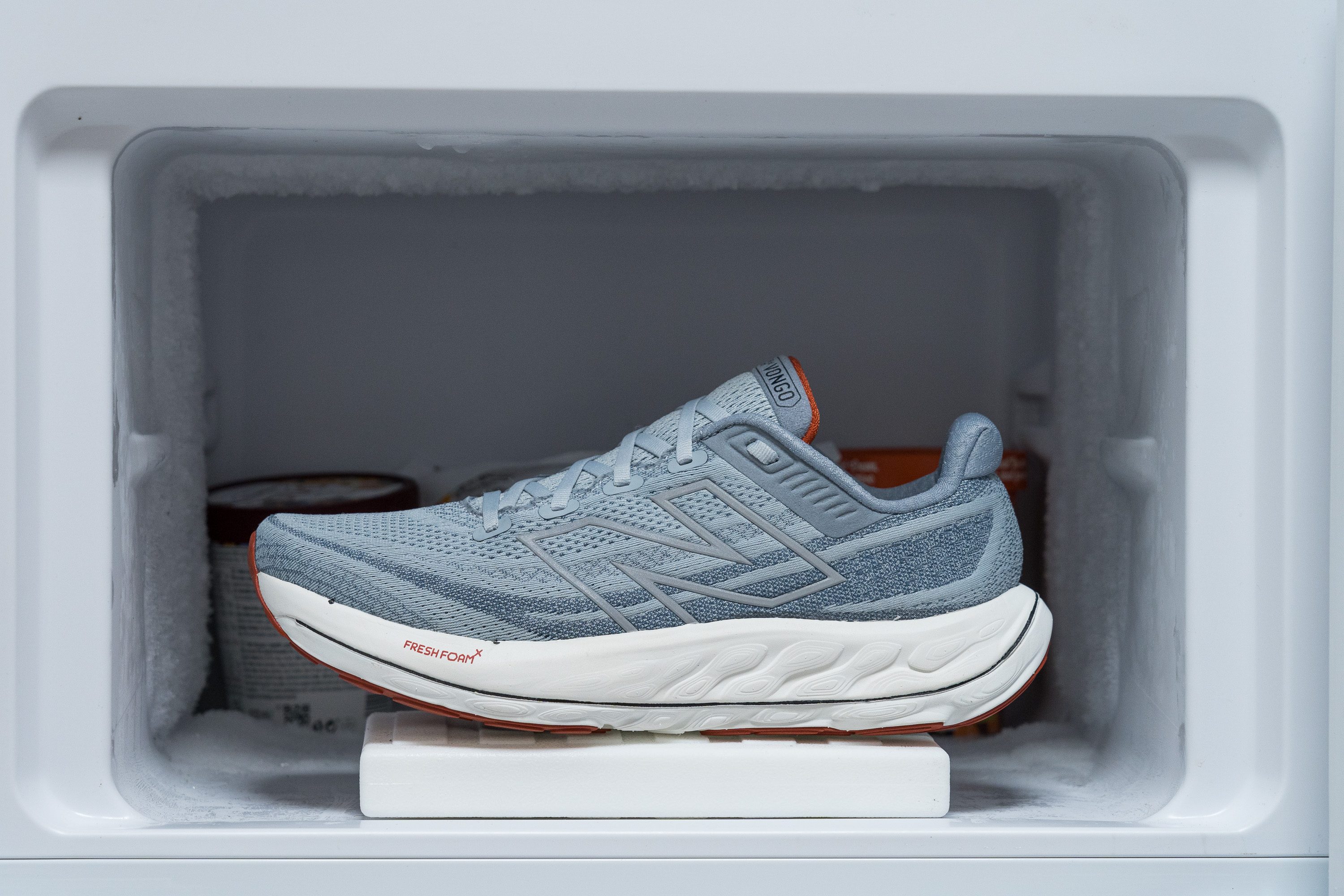
| Fresh Foam X Vongo v6 | 27% |
| Average | 24% |
Reflective elements
In this review, we've highlighted similarities between the Vongo v6 and the 1080 v13, and one standout common feature is the large reflective N logo. We love it!
| Fresh Foam X Vongo v6 | Yes |
Tongue padding
Our testing revealed that the tongue is padded with a generous 7.7 mm of cushioning.
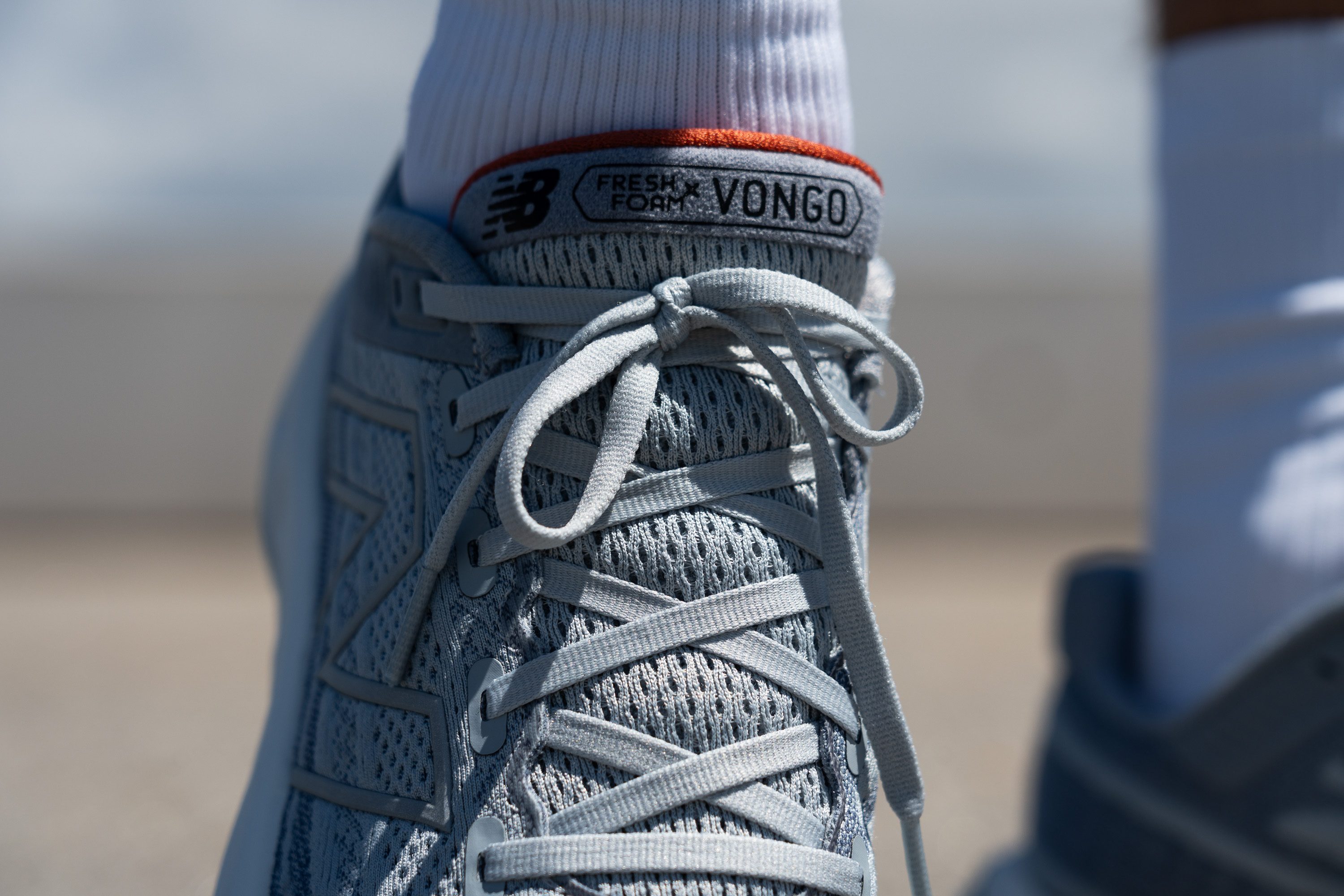
This exceeds the usual padding found in many shoes, although some may still want a bit more, given the shoe's emphasis on comfort. Nevertheless, we consider this design a wise balance—it offers sufficient padding to enhance comfort without adding unnecessary weight. And this shoe is already quite heavy...
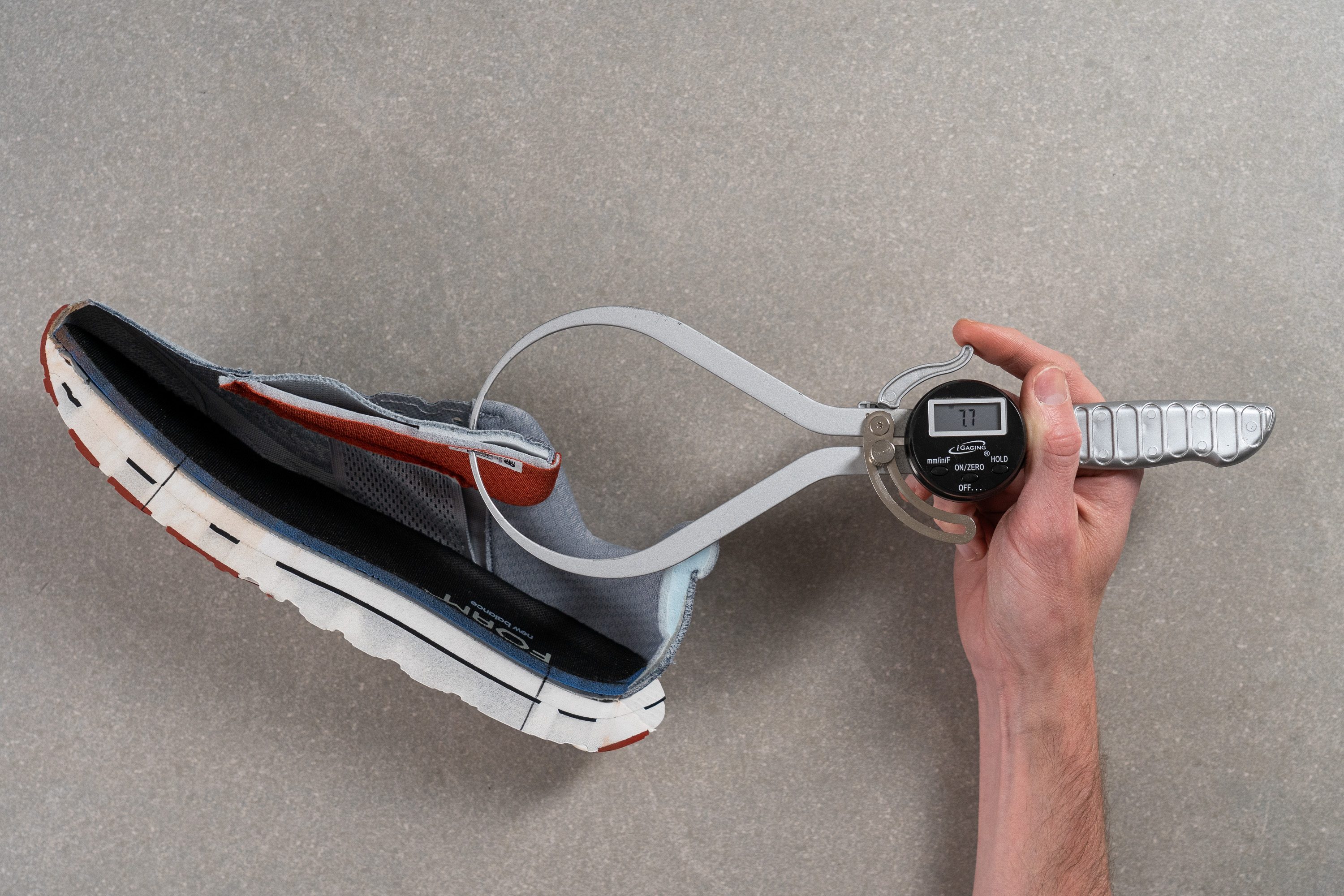
| Fresh Foam X Vongo v6 | 7.7 mm |
| Average | 5.7 mm |
Tongue: gusset type
The tongue features a semi-gusseted design, meaning it's partially attached to the shoe's sides. This addition enhances the lockdown and stops the tongue from sliding sideways, providing a more stable fit.
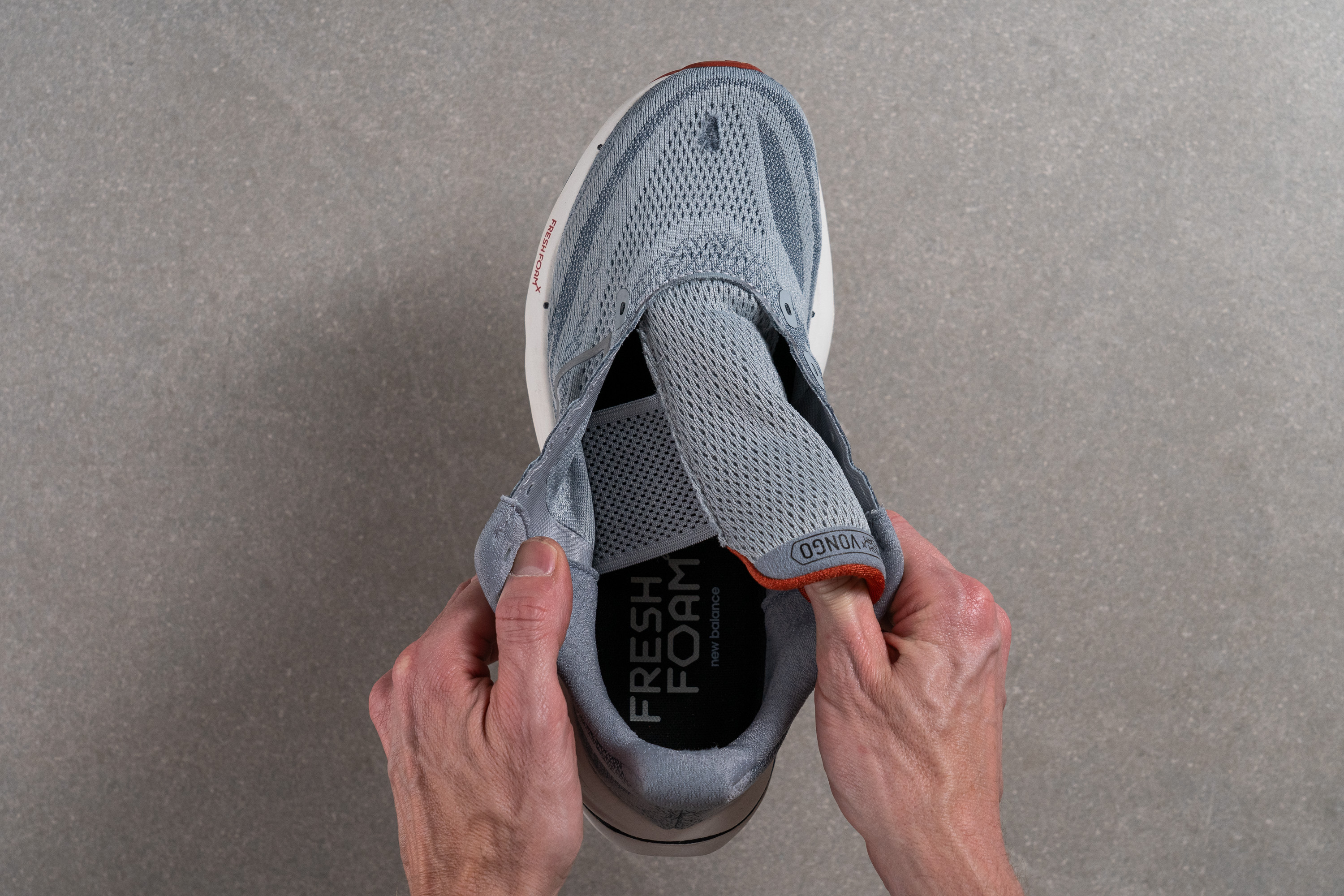
| Fresh Foam X Vongo v6 | Both sides (semi) |
Heel tab
The Vongo v6 lacks the finger-loop heel tab found on many other shoes; however, it features an extended and ultra-padded heel collar.
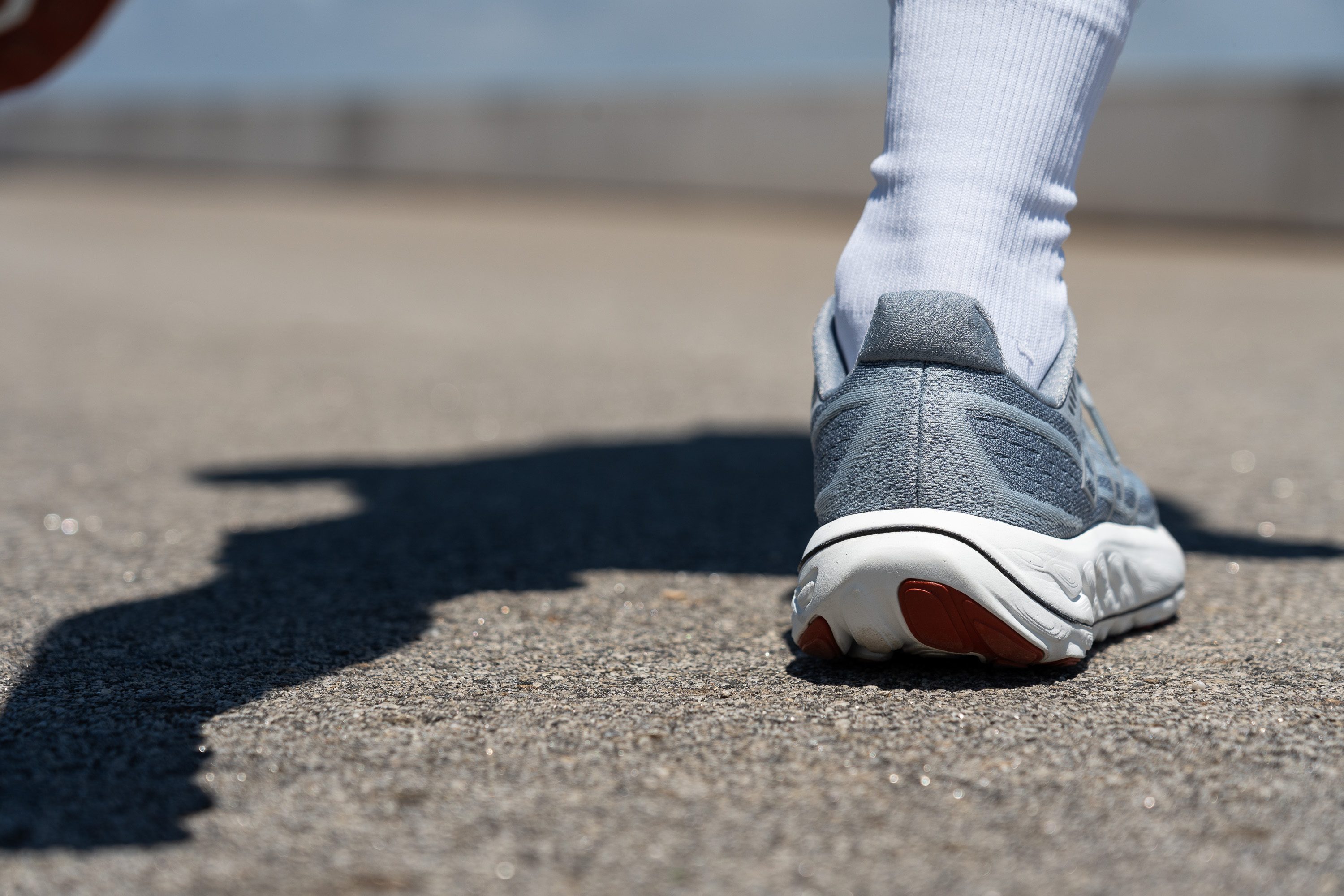
| Fresh Foam X Vongo v6 | Extended heel collar |

